
Dynamics

|
Generational Dynamics |
| Forecasting America's Destiny ... and the World's | |
| HOME WEB LOG COUNTRY WIKI COMMENT FORUM DOWNLOADS ABOUT | |
European finance ministers fail again to solve euro crisis
This morning's key headlines from GenerationalDynamics.com.
* Iranian students voice outrage over Britain’s 'hostile' policies
* Iran's Revolutionary Guard behind the British Embassy attack
* Pakistan announces boycott of international Afghanistan conference
* European finance ministers fail again to solve euro crisis
* Eurozone and IMF leaders approve bailout payment to Greece
* Israel approves 119 new settler homes in Shilo in West Bank
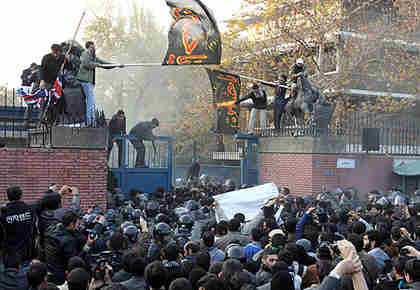 |
More than 20 Iranian students staged a large rally outside the British Embassy compound in Tehran on Tuesday, chanting “Death to Britain” and “Death to the United States.” The students entered the compound, shattered windows threw documents out the windows, and pulled down the embassy’s British flag and burned it. The police then stepped in, dispersed the protesters, and arrested a number of them. The students made the move in response to London’s imposition of new sanctions on the Islamic Republic over its nuclear program last week. Tehran Times
There was little attempt to hide the fact that this was an official Iranian protest. This was not a spontaneous student protest, such as the ones that Iran saw in 2009. These students included members of the paramilitary basij brigades and carried banners naming Qassem Suleimani, the commander of the Quds Force, which runs the overseas operations of the Revolutionary Guard. It was clear that the most hardline institutions of Iran's government -- the parliament, the judiciary and the supreme leader -- were behind the attack. The attack may well be part of the huge generational power struggle going on in Tehran, as the President Mahmoud Ahmadinejad was clearly not involved in the attack. Guardian
I've been covering Iran for years, and it continues to be the most fascinating country from the point of view of generational theory. Tuesday's attack on the British Embassy was an almost comical attempt to replay the student attack on the American Embassy in Tehran. That attack led to the Iranian hostage crisis that turned out to be "magic" for the Iran's Great Islamic Revolution, since it unified the entire country behind the man who led the overthrow of the Shah, Ayatollah Ruhollah Khomeini. (See, for example, "China 'betrays' Iran, as internal problems in both countries mount" from 2008.)
The new supreme leader, Ayatollah Ali Khamenei, would like to recapture the eroticism of his youth by replaying such events. What he doesn't understand is that something like that works only in an generational crisis era, which is where Iran was in 1979. Today, one generation past the Revolution and the Iran/Iraq war, Iran is in a generational awakening era, and the students are not going to unify behind the hardline leaders. Just like the students in America's last awakening era in the 1960s-70s rebelled against their parents, the survivors of WW II, today's students in Iran are rebelling against their own parents, the survivors of the Great Revolution. Tuesday's protest was a farce, and it proves the validity of the old saying, "There's no fool like an old fool."
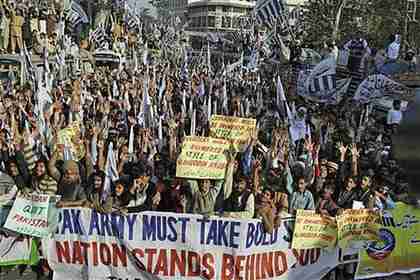 |
At a meeting in Lahore on Tuesday, Pakistan's cabinet decided to boycott a key international conference on the Afghanistan war, to be held in Germany next month. Pakistan's boycott will make the international meeting almost pointless. Pakistan is ramping up its protest over the recent Nato air strikes that killed 24 Pakistani soldiers. Pakistani fury against Nato and the West has been growing steadily every since the May 2 military action that killed Osama bin Laden in a suburb of Islamabad. Popular Anti-American protests have been growing steadily, demanding that all ties with the Americans be cut, even if it means losing American aid. AFP
With the eurozone collapsing all around them, finance ministers of the 17 eurozone countries met in Brussels on Tuesday but failed again to agree to terms of the European Financial Stability Facility (EFSF), the "Big Bazooka" bailout fund that they're fantasizing will save the euro. Things have gotten so bad that regional banks are now afraid to deposit money with the European Central Bank (ECB), for fear that there will be delays in getting it back when they need it. Telegraph
As expected, the next €8 billion bailout payment to Greece has been approved by the eurozone finance ministers and the International Monetary Fund, despite the fact that Greece has not met the conditions that have been set for receiving the payment. However, not providing the bailout money would have caused Greece to go bankrupt by mid-December, triggering a nation banking collapse that would spread to a banking collapse throughout the eurozone, and so the finance officials had to provide the bailout payment whether Greece has complied or not. However, bickering between ministers in the new interim government of Prime Minister Lucas Papademos is increasing again, creating doubts that the austerity measures that have already been committed will be implemented. Kathimerini (Athens)
Israel has approved construction of 119 additional settler homes in the West Bank settlement of Shilo, a move that is likely to draw widespread condemnation. An additional 50 units that had begun construction illegally, without the necessary government permits, were approved retroactively. The Palestinian Authority condemned the construction of new homes, saying that such moves kill what remains of the "peace process," as if any "peace process" still exists at all. AFP and Gulf News
(Comments: For reader comments, questions and discussion,
see the 30-Nov-11 World View -- Iran relives its glorious past as students storm Tehran's British embassy
thread of the Generational Dynamics forum. Comments may be
posted anonymously.)
(30-Nov-2011)
Permanent Link
Receive daily World View columns by e-mail
Donate to Generational Dynamics via PayPal
U.S. military reviews supply routes after Pakistan debacle
This morning's key headlines from GenerationalDynamics.com.
* Wall Street stocks surge 3% while governments are paralyzed
* Munchau: The eurozone really has only days to avoid collapse
* Moody's: Euro crisis threatens all of Europe
* OECD: Euro (and American) financial crises threaten the whole world
* Paralysis continues to grow in Washington and Europe
* First day of polling in Egypt better than expected
* Evidence grows that Dominique Strauss-Kahn was set up
* U.S. military reviews supply routes after Pakistan debacle
* Israel to release $100 million to the Palestinian Authority
* Debka: Nato and Turkey prepare for military intervention in Syria
 |
Wall Street traders, deep into some kind of drug-induced state of denial, pushed stocks up 3% on Monday, when one mainstream analyst after another was predicting everything from a series of financial shocks in Europe to a total collapse of the euro zone. This includes Wolfgang Münchau, the leading, well-respected European financial analyst, Moody's Investors Services, and the Organization for Economic Cooperation (OECD).
"In virtually all the debates about the eurozone I have been engaged in, someone usually makes the point that it is only when things get bad enough, the politicians finally act – eurobond, debt monetisation, quantitative easing, whatever. I am not so sure. The argument ignores the problem of acute collective action.
Last week, the crisis reached a new qualitative stage. With the spectacular flop of the German bond auction and the alarming rise in short-term rates in Spain and Italy, the government bond market across the eurozone has ceased to function. ...
I have yet to be convinced that the European Council is capable of reaching such a substantive agreement given its past record. Of course, it will agree on something and sell it as a comprehensive package. It always does. But the half-life of these fake packages has been getting shorter. After the last summit, the financial markets’ enthusiasm over the ludicrous idea of a leveraged EFSF evaporated after less than 48 hours.
Italy’s disastrous bond auction on Friday tells us time is running out. The eurozone has 10 days at most." Wolfgang Münchau, Financial Times (Access)
"The continued rapid escalation of the euro area sovereign and banking credit crisis is threatening the credit standing of all European sovereigns. ...
While Moody's central scenario remains that the euro area will be preserved without further widespread defaults, even this 'positive' scenario carries very negative rating implications in the interim period. The rating agency notes that the political impetus to implement an effective resolution plan may only emerge after a series of shocks, which may lead to more countries losing access to market funding for a sustained period and requiring a support program. ...
However, over the past few weeks, the likelihood of even more negative scenarios has risen. ... Alternative outcomes fall into two broad categories: those involving one or more defaults by euro area countries (in addition to Greece's PSI program); and those additionally involving exits from the euro area.
"The euro area crisis remains the key risk to the world economy.... Concerns about sovereign debt sustainability are becoming increasingly widespread. If not addressed, recent contagion to countries thought to have relatively solid public finances could massively escalate economic disruption. Pressures on bank funding and balance sheets increase the risk of a credit crunch.
Another serious downside risk is that no action would be agreed to offset the large degree of fiscal tightening implied by current law in the United States. This could tip the economy into a recession that monetary policy could do little to counter.
'Prospects only improve if decisive action is taken quickly,' said OECD Chief Economist Pier Carlo Padoan. 'In the euro area, the risk of contagion needs to be stemmed through a substantial increase in the capacity of the European Financial Stability Fund, together with a greater ability to call on the European Central Bank’s balance sheet. Much greater firepower must be accompanied by governance reforms to offset the risk of moral hazard,' he said.
Improved prospects would also depend on the enactment of a credible medium-term fiscal programme in the United States." Organization for Economic Cooperation (OECD)
The story goes that when the Ottoman Muslims were approaching the center of Constantinople for the final conquest of the Byzantine Empire in 1453, the people of the Senate spent their last few days having a lengthy political debate about whether angels were male or female. Thus, the major news stories on Monday were lengthy analyses and debates about the effect on Herman Cain's campaign about a possible love affair that he had years ago.
Long-time readers of my web site have known for a long time that this crisis was coming with 100% mathematical certainty. The paralysis affecting Europe is the same paralysis that affected the Congressional "Super Committee," and the rest of Washington. If any solution existed to the massive collapse of the real estate and credit bubbles, then it would be tried. Since no solution exists, all the politicians can do is bicker and point fingers at each other.
It's still possible that the crisis will be postponed a little longer. The euro leaders are meeting on December 9, and perhaps they will make a "big bazooka" announcement, such as agreeing that the European Central Bank (ECB) should "print" unlimited amounts of money to prevent Italy, Spain and France from going bankrupt. However, from the point of view of Generational Dynamics, not only will that not prevent the crisis, but it won't even prevent the accelerating deflationary spiral, as deleveraging continues and the velocity of money plummets to zero.
People keep asking me for investment advice. I'm an analyst, not an investment counselor, but from the point of view of Generation Dynamics, you should focus on preserving your assets, and NOT on getting one or two extra percentage points of interest. The best investment advice now is to keep some cash hidden in your basement, and the rest (for Americans) in FDIC insured bank accounts -- preferably more than one. These appear to be the safest "investments" today.
Although there were a few "thuggish acts" in some polling stations on Monday, the first day of parliamentary elections was almost completely non-violent and was widely cheered by the huge numbers of voters standing in line to vote. The fears of widespread violence from the now-defunct National Democratic Party (NDP) to rig elections did not occur. However, the Muslim Brotherhood’s Freedom and Justice Party (FJP), which is widely expected to win the election, was found by reporters to be violating Egypt's election laws by passing out campaign leaflets near polling stations. Al-Ahram
Thanks to extensive research by Edward Jay Epstein, writing for the New York Review of Books, evidence is growing that the sexual assault charges brought by a hotel maid against former IMF chief Dominique Strauss-Kahn earlier this year were a setup. If a setup is confirmed, it would not surprise me in the least. Guardian
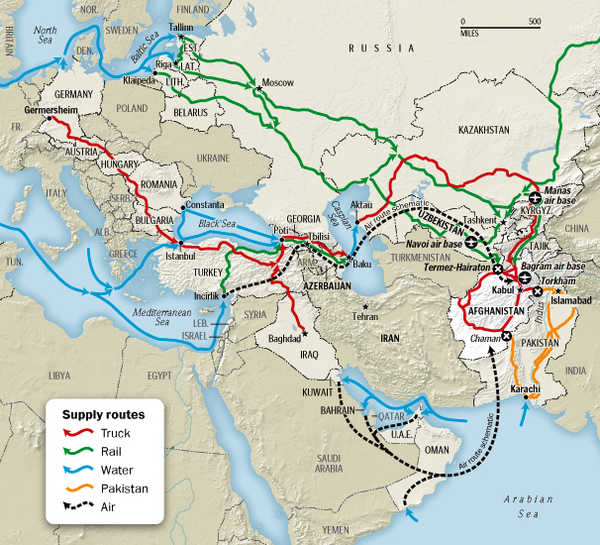 |
Pakistan's decision to close Nato's resupply routes into Afghanistan is forcing the U.S. and Nato military forces to reexamine their strategy for supplying everything from food to tanks. The army will have to rely much more heavily on the Northern Distribution Network (NDN), which comprises rail and truck routes traversing several countries in Europe and Central Asia, including Russia, Uzbekistan and Kyrgyzstan. It already accounts for about 40 percent of U.S. cargo deliveries into Afghanistan and 52 percent of all coalition cargo. One route from the north, established in 2010, starts with long-haul trucks that leave from Germany. As of October, truck drivers made about 2,000 deliveries to Afghanistan. During that time, only two trucks failed to reach their destination. Stars and Stripes
Israel's Prime Minister Benjamin Netanyahu indicated on Monday that he favored releasing some $100 million owed to the Palestinian Authority. This is money from border and customs fees that Israel collects on behalf of the Palestinian Authority. However, Israel has frozen these payments to punish the Palestinians for their attempts to join the United Nations. Netanyahu says that the Palestinians appear to have suspended their efforts at the U.N., though the freeze would be reinstated if the Palestinians revive those efforts. AP
A group of military officers from NATO and Persian Gulf nations, including the United States, France, Canada, Qatar, Saudi Arabia and the United Arab Emirates, have quietly established a mixed operational command in Turkey on the border of North Syria Their mission is to set up "humanitarian corridors" inside Syria to serve the victims of Bashar al-Assad's crackdown. Commanded by ground, naval, air force and engineering officers, the task force aims to move into most of northern Syria. Debka
(Comments: For reader comments, questions and discussion,
see the 29-Nov-11 World View -- Paralyzed with fear, the Euro Zone faces collapse 'within days'
thread of the Generational Dynamics forum. Comments may be
posted anonymously.)
(29-Nov-2011)
Permanent Link
Receive daily World View columns by e-mail
Donate to Generational Dynamics via PayPal
China home builders face payment delays, as real estate bubble implodes
This morning's key headlines from GenerationalDynamics.com.
* Egypt's elections to go ahead despite violence
* Four major party coalitions vie for seats in Egypt
* Nationalist Imran Khan gets political boost from Pakistan air strike
* Arab League approves 'unprecedented' sanctions on Syria
* China home builders face payment delays, as real estate bubble implodes
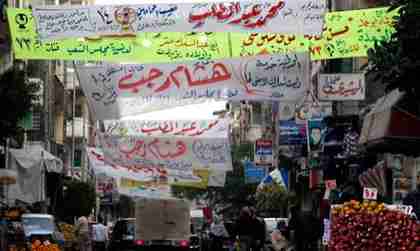 |
Sunday was the ninth consecutive day of running street battles between demonstrators and police. There is widespread suspicion that the Supreme Council of the Armed Forces (SCAF) has allowed the violence to develop as a pretext for delaying elections and thus maintain its own grip on power, though they deny this. Many protesters have an "anyone but SCAF" view, and look forward to the changes that might occur after the parliamentary elections that start on Monday. Other groups, including some protesters, are fearful of the elections -- not because they like the SCAF, but because they fear what will take its place. Thus, there is widespread concern that there are many people who hope to use violence to scuttle the elections, to prevent a completely uncertain future. Haaretz
Possibly the most concerned are the Coptic Christians, who received public support from Hosni Mubarak, but have been left on their own since Mubarak was overthrown. It's estimated that 93,000 Copts have left Egypt since March, and estimates are that the number could reach 250,000 by 2012, especially if a hardline Islamist government comes to power. he community is still reeling from the Maspero incident on October 9, in which security forces clashed with Copts who were protesting an attack on a church in Aswan. At least 26 Copts were killed in the violence and more than 300 were wounded. Al-Jazeera
Since the fall of Hosni Mubarak in February, ending decades of enforced one-party rule, dozens of parties have sprung up, all hoping to make it big. They fall into four major groups:
The Muslim Brotherhood has become more centrist than in the past, as it is torn between the vanishing old leaders, who yearn for the days of violence, and the youth groups that want it to become fully secular. It is expected to emerge as the largest party, though not a majority, since it has the best organization. Guardian
 |
As we reported last month, former cricket superstar turned politician Imran Khan has become the "hope and change" candidate for president of Pakistan by nationalistic criticisms of Nato and the United States. His Islamist party, Tehreek-e-Insaf (PTI) (Movement for Justice), received a big boost on Sunday when former foreign minister Shah Mehmood Qureshi joined Khan's PTI party, having bolted from the governing PPP party of President Asif Ali Zardari. At Sunday's rally, Imran Khan condemned the NATO strike and demanded that Pakistan order all CIA agents to leave in protest. "We should raise the issue at the UN Security Council because it was an attack on our country and soldiers… We need not bow before any one. The time has come to build a new Pakistan by introducing a new system reflecting will of the people." Earlier, Khan said that this is the time to part ways with America and walk out of its war which has already engulfed over 40,000 Pakistanis. He said there is no win in sight in this war and no one even knows how a victory could be defined regarding this conflict. Pakistan, he asserted, was fighting this war only for dollars. The Nation (Islamabad)
As expected, the Arab League overwhelmingly approved economic sanctions against Syria on Sunday, to pressure the Bashar al-Assad regime to stop slaughtering innocent Arabs. The move was called "unprecedented" by the Arab League, but forced out of fear that if the Arab League didn't take action, then there might be unwanted foreign intervention in Syria, from Turkey or Nato. Of the 22 member nations of the Arab League, all voted for the sanctions except for Syria, whose membership has been suspended, and for Iraq and Lebanon, who abstained. Day Press News (Syria)
About 80% of China's construction companies are reporting increasing delays in receiving payments for work on belahf of property developers, according to a survey by Credit Suisse. Home builders also said they were being asked to further slow down the pace of work on projects already underway. Land purchases by Chinese developers have plummeted. China is experiencing a massive real estate bubble, much larger than America's, whose collapse is still in progress after almost five years. China's real estate bubble is only beginning to collapse, with falling prices accelerating in October. With Europe's finances in crisis, and America's finances close to crisis, it looks like 2012 is going to be a very difficult year. Bloomberg
(Comments: For reader comments, questions and discussion,
see the 28-Nov-11 World View -- Four major party coalitions vie for seats in Egypt
thread of the Generational Dynamics forum. Comments may be
posted anonymously.)
(28-Nov-2011)
Permanent Link
Receive daily World View columns by e-mail
Donate to Generational Dynamics via PayPal
Israel to assist Kenya's invasion into Somalia to attack Al-Shabaab
This morning's key headlines from GenerationalDynamics.com.
* Arab League prepares package of sanctions against Syria
* Israel to assist Kenya's invasion into Somalia to attack Al-Shabaab
* Egypt's liberal parties show confusion as Muslim Brotherhood gathers strength
* U.S. and Nato air strikes at border post kill 24 Pakistan soldiers
* Pakistan to U.S.: Pack your bags
* Nasa launches car-sized 'Curiosity' rover to Mars
 |
Although president Bashar al-Assad likes to consider Syria the "heart" of the Arab world, his regime's continuing bloody violence against innocent Arab people, and apparent repeated lies to the Arab League, have turned a lot of the Arab world against him. The Arab League finance ministers worked late into the evening on Saturday to prepare a package of sanctions, to be submitted on Sunday. The sanctions call on Arab states to cut commercial ties with Syria's government, freeze its assets, ban travel by senior Syrian officials, and halt commercial flights to the country. However, some Arab states, especially Iraq, are opposed to the sanctions, and it's not clear whether they will have much effect. Reuters and AFP
Israel is offering to help Kenya in its recently begun invasion of Somalia to eliminate the terrorist group al-Shabaab. Israeli Prime Minister Benjamin Netanyahu said that "Kenya’s enemies are Israel’s enemies." However, several Muslim lobby groups in Kenya are opposing Israeli intervention. According to one lobbyist, "Many Muslim countries have cut diplomatic ties with Israel. Even the president's efforts to woo the Arab world into supporting the war against al-Shabaab may not yield much." Jamestown and All Africa
With parliamentary elections coming up on Monday, the 30 plus secular "liberal" parties are fractured and in a state of confusion. The only parties with a good organizations are the Muslim Brotherhood's Freedom and Justice Party and Hosni Mubarak's old ruling National Democratic Party (NDP). According to one prominent liberal blogger, "We're not fighting any political party, or the army, or the Muslim Brotherhood – we're fighting a structure. And that's what the liberal political elite don't seem to understand. I'd much rather have the Muslim Brotherhood in place and get rid of Scaf than I would have [liberal figurehead] Mohamed ElBaradei running the government but leave Scaf in power. The revolution against Scaf is now; there will be time later to play the reformist, gradualist game where we sit down and argue over minute policy differences." Guardian
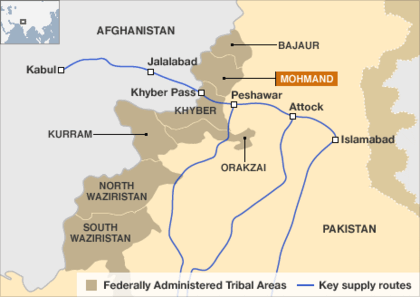 |
In possibly the biggest blow yet to Pakistan-U.S. relations, U.S. and Nato helicopters and fighter jets attacked two Pakistan army border posts in Mahmoud, killing 24 people and injuring 13. Pakistani officials said there had been no militant activity in the area, and most of the Pakistani soldiers were asleep. They also said Nato had the grid references of the posts and therefore should not have fired. Nato military sources say US-Afghan special forces had been in the area, where they believed a Taliban training camp was operating, and that they returned fire when they came under attack from Pakistan. The conflicting stories will be investigated by both sides. BBC
"Going a step ahead of merely condemning the outrageous NATO attack on a military outpost in Mohmand, the Defence Committee of Cabinet (DCC), on Sunday, decided to close with immediate effect the NATO/ISAF logistics supply lines through the country. The decision has been taken in accordance with the resolution of the joint session of parliament of May 14, 2011, which was held after the May 2 incident in which US forces violated the country’s airspace to hunt down Osama bin Laden. The DCC also decided to ask the US to vacate the Shamsi Airbase within 15 days. The committee termed the attack on Pakistan Army border posts totally unacceptable, which warrants an effective national response. The DCC also discussed the terms of engagement with the US and ISAF for war against terrorism and concurred on revisiting and undertaking a complete review of all programmes, activities and cooperative arrangements with US/NATO/ISAF, including diplomatic, political, military and intelligence." Daily Times (Islamabad)
Mars Science Laboratory, which carries a car-sized rover named Curiosity, lifted off at 10 am Saturday, with expected arrival on Mars on August 6, 2012. Instead of using parachutes or bubble wrap to land the rover, as in previous missions, this mission will use a "sky crane" attached to a small rocket to gently land the rover on Mars.
The following Youtube video is a cool 11 minute animation that shows how it will all play out.
Nasa Jet Propulsion Laboratory
(Comments: For reader comments, questions and discussion,
see the 27-Nov-11 World View -- Furious Pakistan shuts Nato down after deadly border strike
thread of the Generational Dynamics forum. Comments may be
posted anonymously.)
(27-Nov-2011)
Permanent Link
Receive daily World View columns by e-mail
Donate to Generational Dynamics via PayPal
Greece to demand investors increase bond 'haircut' to 75%
This morning's key headlines from GenerationalDynamics.com.
* Once again, Turkey threatens Syria, but then says it won't intervene
* Vietnam increases South China Sea presence to confront China
* Iceland rejects land sale to wealthy tycoon from China
* Egypt's parliamentary election will proceed on Monday
* Rival army units clash in Yemen's capital, Sanaa
* Yield inversion in Italy shows euro financial crisis deepens
* Greece to demand investors increase bond 'haircut' to 75%
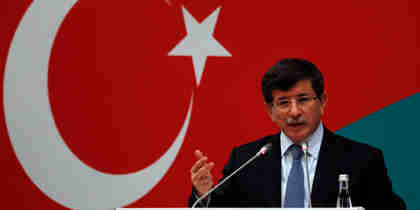 |
Turkey's Foreign Minister Ahmet Davutoglu said on Friday that Turkey can tolerate no more bloodshed in Syria and is ready to take action along with Arab powers if Syrian President Bashar al-Assad fails to take steps towards ending his crackdown on pro-democracy demonstrators. He said: "Today is an historic decision day for Syria. It must open its doors to observers. If it doesn't, there are steps we can take in consultation with the Arab league. I want to say clearly we have no more tolerance for the bloodshed in Syria. The attitude of friendly and fraternal countries on this subject is clear." Well, perhaps it's not really so clear. On Friday, the latest deadline by the toothless Arab League passed, with no compliance from Syria. The Arab League put forth an awesome threat, if Syria doesn't comply: "This is the collective wish of the Arab world and if they don’t, God forbid, we [will] have to meet again." So the Arab League's response will be to hold one more meeting! What steps does Turkey plan to take? Bülent Arinç, Turkey’s deputy prime minister said that it won't involve actually intervening in Syria. "There is absolutely no such thing. Some Turkish politicians and some countries are saying Turkey will intervene in Syria. This is totally wrong. This is impossible, we don’t think of it." Zaman (Istanbul)
Vietnam is expanding its presence on the Spratly Islands in the South China sea, by building roads and schools to assert sovereignty, and to challenge China's claims to the islands. The Philippines, Vietnam, China, Malaysia and Taiwan have troops on the Spratlys, a group of islands and reefs with a total land area equivalent to 1 1/2 times the size of New York’s Central Park. Vietnam also plans to seek talks with China on the Paracel Islands. China ousted Vietnam in a 1974 battle in which 71 soldiers were killed. Bloomberg
Iceland said on Friday it had rejected a bid by a Chinese tycoon to buy a 300-square kilometre (186 sq mile) chunk of isolated land on the North Atlantic island for green tourism as it did not meet legal requirements on foreign ownership. Analysts had questioned the deal's security aspects, given Iceland's strategic location between Europe and the United States, and its proximity to the Arctic where a number of nations are competing to make resource claims. In fact, the United States signed a mutual defense treaty with Iceland in 1951, because of the country's strategic position during WW II. Reuters
 |
Fear's that unrest would cause Monday's scheduled parliamentary election to be canceled were swept aside on Friday, when some 100,000 people crowded into Cairo's Tahrir Square, demanding that the army step aside and give power to a civilian government. There was almost no violence, and the demonstrations had the air of a carnival, with men, women and face-painted children enjoying the autumn weather. The Muslim Brotherhood's Freedom and Justice Party did not support the protest, fearing that the chaos might disrupt the elections that it is poised to dominate. This has led to accusations that the organization is selling out to the army. LA Times
When Yemen's president Ali Abdullah Saleh signed an agreement earlier this week to step down after 35 years of rule, it was hoped that it would end the protests and clashes between demonstrators and regime security forces. Instead, the agreement is triggering even more violence clashes than before, between Saleh's opponents and supporters. Friday's clashes pitted Central Security forces commanded by Saleh's nephew, Col. Yehia Saleh, against troops from the First Armored Division, headed by Gen. Ali Mohsen al-Ahmar, who defected and joined the protesters in March. Apart from the military clashes, there were huge protests in Sanaa on Friday, among people objecting to the clause in the agreement that gives Salah immunity from prosecution. AP
There was so much bad news coming out of Europe on Friday, that it's hard to decide what to pick. The following charts are interesting:
 |
On Friday, the yields (interest rates) on Italy's debt reached astronomical proportions. Investors borrowing money for 2 years demanded 7.664%, and those borrowing money for 10 years demanded 7.261%. Normally, short term bonds have lower yields than long term bonds since, after all, it's riskier to lend money for 10 years than for 2. But in the case of Italy's bonds, the yields are "inverted." There are various theories on why this would happen, but the most reasonable seems to be that investors consider Italy's chances of default to be very high for all bonds, but considers 10-year bonds slightly more likely to survive default proceedings than 2-year bonds. The yield curves for Greece, Ireland and Portugal all inverted shortly before these countries sought bailouts.
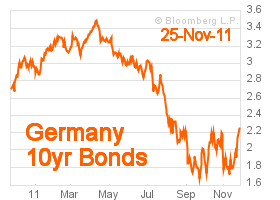 |
Meanwhile, the hard core of the euro zone, Germany, saw its own 10-year yields continue to rise, following Wednesday's failed bond auction, labeled by some analysts as a "catastrophe." This indicates that the bond panic in Europe is continuing to spread into the core nations. The next meeting of the Eurogroup financial ministers will be on December 9. At that time, they'll grant the next €8 billion bailout payment to Greece -- just in the nick of time to avoid bankruptcy -- but we'll have to wait and see whether they announce some "big bazooka" to try to save the euro. Wall Street Journal (Access)
Last months bailout agreement with the EU called for Greece's investors, mostly banks, to take a 50% "haircut" on Greek bonds they own, up from the 21% "voluntary" haircut agreed two months earlier. Now reports suggest that the Greek government is playing hardball with the banks, demanding that they accept a 75% haircut, meaning that the nominal value of their bond holdings is reduced by 75%, and reserving the right to pass a law forcing reluctant creditors to accept the larger haircut. Kathimerini
(Comments: For reader comments, questions and discussion,
see the 26-Nov-11 World View -- Despite chaos, Egypt's parliamentary election will proceed on Monday
thread of the Generational Dynamics forum. Comments may be
posted anonymously.)
(26-Nov-2011)
Permanent Link
Receive daily World View columns by e-mail
Donate to Generational Dynamics via PayPal
A quick overview of economics in the Euro Zone
This morning's key headlines from GenerationalDynamics.com.
* Massive protester confrontation with Egypt's army expected on Friday
* Four people killed in clashes in Saudi Arabia
* Saudi Arabia may limit remittances of foreign workers
* China's South China Sea aggression is leading to military buildup
* Germany's Angela Merkel repeats her opposition to 'Euro Bonds'
* German resistance to the 'Euro Bond' may be shrinking
* Town of Filettino declares independence from Italy
* Fitch Ratings cuts Portugal's credit rating to junk status
* A quick overview of economics in the Euro Zone
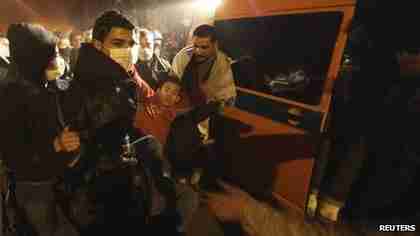 |
A massive protest and confrontation with security forces is planned for Tahrir Square in Cairo, Egypt, on Friday. Over 30 political parties and groups have called for a million-man march on Friday in Cairo and across the country to articulate a single demand: that the ruling Supreme Council of the Armed Forced (SCAF) – along with its head, Field Marshal Hussein Tantawi – immediately hand over executive power to a civilian authority. Notably, the Muslim Brotherhood movement will be conspicuously absent from Friday’s planned protest. The group's younger cadres are objecting to the policies of its octogenarian leadership. Al-Ahram
Saudi Arabia has so far escaped the "Arab Spring" demonstrations and riots that have occurred in countries around the region, largely by spending large sums of money on housing and other public benefits. But four people were killed in Thursday in clashes with Saudi security forces. Saudi Arabia is a Sunni Muslim country with a minority Shia population in the eastern region closest to Iran. CNN
There are an estimated 9 million foreign workers and dependents in Saudi Arabia, taking nine out of 10 private sector jobs. Last quarter, they remitted $7.1 billion to their families in the home countries, amounting to the equivalent to 17 percent of Saudi Arabia’s current account surplus at a time of historically high oil revenues. Now, with the growing global financial crisis, Saudi officials is looking for ways to control and reduce these remittances. However, this could backfire, since most foreign workers come to Saudi Arabia for no other purpose than to send their salaries back to their families, and these foreign workers are essential to keeping the economy running. Al-Arabiya
China has been making aggressive claims to the entire South China Sea, including regions historically belonging to other countries, and has backed them up with threats of military attacks. The purpose of these bellicose statements was to convince nations like Philippines and Vietnam to back off, or to negotiate individually with China to resolve boundary disputes, so that these countries won't "gang up" on China. However, China's Asian neighbors have instead formed a "united front," and have sent vessels to claim sovereignty over islands claimed by China. Thus, according to an Indian analysis, China has failed in its objectives and has antagonized most of its neighbors. Instead, China has become increasingly isolated, with the result that most nations, plus the United States, have built up their own military capabilities in the region to confront the Chinese. Institute for Defence Studies & Analyses (India)
At a press conference on Thursday, German Chancellor Angela Merkel repeated her opposition to euro bonds. These would be issued by the eurozone as a whole, in the belief that investors would feel confident enough in them to invest in them. Merkel said, "Nothing has changed in my position," indicating her continued opposition to exposing the German taxpayer to guaranteeing eurobonds issued by any country in the name of the eurozone.
One analyst said, "The market would be euphoric to get euro bonds," and this shows what the problem is. No one is arguing the fundamentals -- that somehow euro bonds would solve the EU's massive structural debt problem. The only argument they have is that investors would be "euphoric." And that's true, but these periods of euphoria have been getting shorter and shorter. If anyone really believed that eurobonds would solve Europe's problems, then probably Merkel would agree to them. But Merkel has seen what's happened, and now she's not willing to jeopardize Germany's economic future for a few hours or a couple of days of market euphoria. Bloomberg
Despite the above, press reports indicate that some officials within German Chancellor Angela Merkel's government have begun discussing the conditions under which they might accept them. The conditions would be to give the EU government, and therefore Germany, much greater fiscal control over "profligate" EU nations that fail to meet strict budgetary requirements. It was just last week that the Irish parliament was in an uproar, worrying that "Germany is our new master." If this concern spreads to other European countries, it could cause quite a situation. Spiegel
Filettino, Italy, a small town 70 km east of Rome, has declared its intention of seceding from Italy and minting its own money. Italy's tough austerity drive includes plans to force local authorities to merge, in a bid to rein in public spending. The tiny village of Filettino faces such a prospect - but its mayor is fighting back. According to Mayor Luca Sellari, "We want to manage our resources independently. This town is rich in natural resources and this could provide great economic opportunities. We have about 8,000 hectares of land, and forests that we could cut, but the state doesn’t allow us to do it. We have water resources, but these are managed by a company in Rome, and we don’t receive any money." VOA
Portugal’s credit rating was cut to below investment grade by Fitch Ratings due to the country’s rising debt level and weakening economy. "The country’s large fiscal imbalances, high indebtedness across all sectors, and adverse macroeconomic outlook mean the sovereign’s credit profile is no longer consistent with an investment-grade rating," said Fitch's statement. The yield on Fitch's 10-year bonds rose to 12.14% after the announcement. Bloomberg
A friend in Portugal sent me the following as her assessment of how things are:
A quick overview of economics in the Euro ZoneSome years ago a small rural town in Spain twinned with a similar town in Greece. The Mayor of the Greek town visited the Spanish town. When he saw the palatial mansion belonging to the Spanish mayor he wondered how he could afford such a house. The Spaniard said; "You see that bridge over there? The EU gave us a grant to build a two-lane bridge, but by building a single lane bridge with traffic lights at either end this house could be built."
The following year the Spaniard visited the Greek town. He was simply amazed at the Greek Mayor's house, gold taps, marble floors, it was marvelous. When he asked how this could be afforded the Greek said; "You see that bridge over there?" The Spaniard replied: "No."
(Comments: For reader comments, questions and discussion,
see the 25-Nov-11 World View -- Massive confrontation in Egypt expected on Friday
thread of the Generational Dynamics forum. Comments may be
posted anonymously.)
(25-Nov-2011)
Permanent Link
Receive daily World View columns by e-mail
Donate to Generational Dynamics via PayPal
Germany's bond auction called a 'complete disaster' as bond panic spreads
This morning's key headlines from GenerationalDynamics.com.
* Happy Thanksgiving
* Germany's bond auction called a 'complete disaster' as bond panic spreads
* EU President Barroso makes strong pitch for 'Stability Bonds'
* Merkel affirms her rejection of Eurobonds in budget debate
* European bank run is starting
* Opposition leader Samaras in Greece continues political theatre
* Turkey's Erdogan offers apologies for killing 14,000 Kurds in 1930s
* Yemen's President Saleh finally agrees to step down after 33 years
* Power struggle is likely in Yemen
* With much wisdom comes much sorrow
 |
The news from Europe was very bad on Wednesday. A full scale bond panic is accelerating, and the rift between Germany and France is growing. It's getting harder and harder for the desperate eurozone leaders to find some way of delaying the final disaster. It might be only a few weeks now.
People are hoping that the U.S. can escape the consequences, but that's a fantasy. A bank run across Europe will quickly devastate the economies of the U.S. and China and the Mideast and, even worse, will lead to conflict and war.
This is 100% certain, and no politician can prevent it. You can't stop what's coming, but you can prepare for it. Treasure the time you have left, and use it to prepare yourself, your family, your community, and your nation.
Thanksgiving day is a good day to start.
Like the United States, Germany has had little trouble borrowing money by selling government bonds at extremely low yields (interest rates). But that suddenly changed on Wednesday, when the German Finance Agency was able to borrow only €3.89 billion, after expecting to sell some €6 billion in bonds. One analyst said, "This is a complete disaster." Another one said, "A growing number of institutional investors have reservations about German government bonds. If Germany's responsibility for the European Financial Stability Facility (EFSF) euro backstop fund should increase, the risk for German sovereign bonds will also increase." Spiegel
On the same day that Germany suffered a "disaster" in its bond auction, European Commission president José Manuel Barroso made an impassioned plea for the adoption of euro bonds, which he cutely renamed "Stability Bonds." The idea is that the euro bonds are backed by all 17 eurozone nations, and so investors will feel safe investing in them. Germany is opposed to the euro bonds, because it's the strongest European economy and thus would its taxpayers would be most exposed to backing the bonds. However, the pressure is growing on Germany to accede to the eurobond demand, and that's probably one of the main reasons why Germany's bond auction fared poorly. Guardian
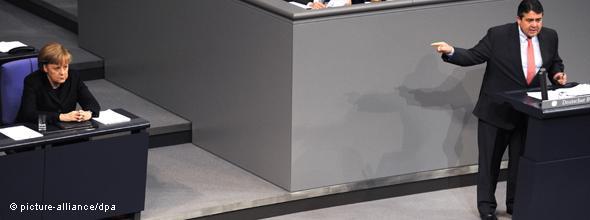 |
In a debate in parliament on Wednesday, German Chancellor Angela Merkel staunchly defended her opposition to the "euro bond" proposal, calling Barroso's proposal "inappropriate." She said:
"I consider it extremely worrying and inappropriate that the European Commission is directing the focus to eurobonds today. ... [It is false to assume that the] collectivization of debt would allow us to overcome the currency union's structural flaws."
The opposition, including the Greens and the Left party, accused Merkel's government of hypocrisy, since her government plans to take on €4 billion euros more debt next year than in the current year. "We ought to save up today, so that we have jobs in this country tomorrow. You are calling for strict austerity in Europe. How credible do you really think this policy is when you're increasing the debt in Germany?" Deutsche-Welle
Spain on Monday paid a whopping 5.22% for three month bonds, and 5.33% for six-month bonds, as Spanish banks are now too weak to support their own government's debt issuance. The reason is a withdrawal of deposits -- a quiet bank run -- that is now in full swing in the banking systems of several southern European countries. The ongoing crisis is putting European banks under enormous pressure. Even German banks are in difficulty. Particularly hard hit is Commerzbank, which may have to ask for government money because of a significantly higher need for recapitalization than thought so far. Commerzbank alone will have an additional need of €5bn, which market analysts think the bank will be unable to raise on the markets. Euro Intelligence
 |
Greece has not yet received a commitment for the next €8 billion bailout payment partially because of some political theatre being played by Antonis Samaras, leader of the opposition New Democracy party. He has refused all along to agree to the austerity measures that Greece committed to when the EU agreed to provide the bailout payments. Led by German Chancellor Angela Merkel, the euro leaders are firmly refusing to pay the bailout money unless all political parties are firmly committed to the austerity measures, and they're demanding that Samaras sign a letter expressing his commitment. On Wednesday, Samaras finally wrote a letter making a partial commitment, saying that "certain policies will have to be modified." Samaras is repeating a previous statement that Merkel has already rejected. Kathimerini (Athens)
Turkey has been fighting an on-and-off conflict with a separatist terrorist group, the Kurdistan Workers' Party (PKK), since the 1980s, and the policies of Prime Minister Recep Tayyip Erdogan have been under attack by opposition parties for not being able to settle the PKK conflict. In a parliamentary debate on Wednesday, Erdogan responded to opposition leader Kemal Kilicdaroglu by apologizing for a 1930s attack that killed 14,000 members of the rebelling Kurdish minority:
"Am I going to apologize or are you? If there is need for an apology on behalf of the state, if there is such a practice in the books, I would apologize and I am apologizing."
The apology was actually a political barb aimed at Kilicdaroglu. At the time of the rebellion, the leader was the revered Kemal Ataturk, in the same party as Kilicdaroglu today. Turkey is also under pressure to acknowledge other dark pages in its history, including the mass killings of Armenians in 1915, a special wealth tax imposed on Jews in the 1940s and attacks on its Greek minority in 1955. AP
 |
After ten months of huge "Arab Spring" street protests, in which his security forces killed hundreds of unarmed street protesters, Yemen's President Ali Abdullah Saleh has agreed to step down within 30 days, after being leader for 33 years. The deal was backed by the United States, and brokered by the Saudi-led Gulf Cooperation Council (GCC). When he finally signed the agreement to step down, he did so in the Saudi capital of Riyadh after most of his allies had abandoned him and joined the opposition. Several months ago, Saleh's palace mosque was bombed and he was treated in Saudi Arabia for severe burns. It's not clear when or if Saleh will return again to Yemen, as he plans to travel to New York for unnamed medical treatment. The agreement gives him immunity from prosecution. AP
The deal opens the way to what will likely be a messy power struggle. Among those possibly vying for power are Saleh's son and nephew, who command the country's best-equipped military units; powerful tribal leaders; and the commander of a renegade battalion. According to one analysis, "What should be one of Yemen's main historical events is tainted by fear of an armed conflict in between General Mohsen's dissident troops, Al-Ahmar tribesmen and the remnants of the regime as many former power-players feel the GCC agreement is not serving their immediate interests. Already clashes in al-Hasaba and near the Square were reported in the early hours of the afternoon and fighter jets were seen hovering above Arhab, north of Sana'a." Yemen Post
My study of Generational Dynamics over almost ten years has taught me a great deal, and has brought me a great deal of grief and sorrow. On this Thanksgiving Day, I'd like to repeat a quote from the Old Testament, which is considered a holy book by Jews, Christians and Muslims alike. Here's Ecclesiastes 1:9-18:
"What has been will be again, what has been done will be done again; there is nothing new under the sun. Is there anything of which one can say, "Look! This is something new"? It was here already, long ago; it was here before our time.There is no remembrance of men of old, and even those who are yet to come will not be remembered by those who follow.
I, the Teacher, was king over Israel in Jerusalem. I devoted myself to study and to explore by wisdom all that is done under heaven. What a heavy burden God has laid on men!
I have seen all the things that are done under the sun; all of them are meaningless, a chasing after the wind. What is twisted cannot be straightened; what is lacking cannot be counted. I thought to myself, "Look, I have grown and increased in wisdom more than anyone who has ruled over Jerusalem before me; I have experienced much of wisdom and knowledge."
Then I applied myself to the understanding of wisdom, and also of madness and folly, but I learned that this, too, is a chasing after the wind.
For with much wisdom comes much sorrow; the more knowledge, the more grief."
Something to think about on Thanksgiving.
(Comments: For reader comments, questions and discussion,
see the 24-Nov-11 News -- Thanksgiving - a time to prepare as the world darkens
thread of the Generational Dynamics forum. Comments may be
posted anonymously.)
(24-Nov-2011)
Permanent Link
Receive daily World View columns by e-mail
Donate to Generational Dynamics via PayPal
Euro collapse now seems inevitable, as Franco-German rift grows
This morning's key headlines from GenerationalDynamics.com.
* Egypt's military leader responds to mass protests
* Massive protests continue in Egypt
* Euro collapse now seems inevitable, as Franco-German rift grows
* Another savior for Europe: The Federal Reserve
* Wild-eyed hyperbole addicts
 |
Field Marshal Mohamed Hussein Tantawi, the head of the Supreme Council of the Armed Forces (SCAF), which has been ruling Egypt since the ouster of Hosni Mubarak, appeared on nationwide TV on Tuesday, hoping to quell the growing protests. Some excerpts:
"In the great 25 January revolution, the people rose up to demand freedom, democracy and social freedom. The armed forces, which are an indispensable part of the people, have taken a national decision that they should be appreciated for siding with the people, embodying unity between the army and the people and being a role model for world revolutions to follow.The SCAF [Supreme Council of the Armed Forces] has borne the responsibility of running the country during this transitional stage which followed the former regime. A series of reform measures have been started on a path towards democracy. We have pledged repeatedly that the armed forces will not be an alternative to the legitimacy sought by the people.
We did not have the ambition to ascend to the throne of power and we did not seek this, but we realised beforehand that politics entails differences in viewpoints... We have been and we are still implementing our first decision since the 25 January revolution as we did not fire one bullet at the chest of any Egyptian citizen. The ancient Egyptian military has an established doctrine that it is an inherent part of the Egyptian people whose task is to protect the nation. We cannot allow standing against the people. ...
Running the country during the transitional period has not been as easy as some people might think... It's easy to talk, but less easy to act. The Egyptian economy is noticeably declining. Whenever the situation moves towards stability, something happens that drags us backwards. But we in the armed forces - the school of patriotism - are used to confronting hardships and we are trained how to be patient until we reach our goal by thorough planning and determination to succeed. Some people tried to drag us to confrontations and we bore hardships, offences and defamation. We did not respond to such attempts and we have been and we still are committed to self-restraint to the maximum degree. ...
The SCAF does not seek power and places the higher interest above any other consideration, and is ready to immediately hand over authority and return to its original task to protect the homeland, through a public referendum, if that is what the people want and if that is what is needed."
Tantawi promised to turn the government over to civilians by July of next year, but the size of the crowds of protesters makes it unlikely that anyone will believe him. In fact, the brutal tactics that the security forces have used against the protesters, resulting in dozens of deaths, have almost completely discredited the army leaders. BBC
There were large protests in Egypt again on Tuesday evening, this time numbering over 100,000 in Cairo and Alexandria. The young protesters had high hopes in February, when Hosni Mubarak was ousted, and the Supreme Council of the Armed Forces (SCAF) took over governing. At that time, they had a fantasy that overthrowing the government would actually improve their lives. Now that it hasn't they're ready to overthrow the government again. They're demanding that the army leaders "return to their barracks," and turn the government over to civilians. But beyond ousting SCAF, the protesters have no idea what they want to accomplish. Al-Jazeera
There are two major ideas to "save" the euro. One is the creation of a "eurobond" which is backed by all the countries in Europe, so that individual countries won't be affected by bond panics. Germany, with memories of the 1920s hyperinflation, sees this as a new path to hyperinflation, and is against it. The second is that the European Central Bank (ECB) "print money" and use it to buy up all the bonds issued by troubled countries, a form of quantitative easing. The ECB is opposed to that for much the same reason - fear of hyperinflation. And anyway, either of these plans would only provide a few months' relief, just as all the previous plans have done. However, it's possible for some idea to change from "politically impossible" to "politically unavoidable" in a matter of days. so we shouldn't yet count out one of these plans. The "Kick the Can Theory" says that something has to be tried, and that something may well be one or both of these. AFP
If German Chancellor Angela Merkel is opposed to the eurobond, and ECB chairman Mario Draghi is opposed to quantitative easing, then perhaps Fed Chairman Ben Bernanke can help out. The U.S. Federal Reserve has been pumping billions of dollars into the European banking system in recent weeks in an attempt to help stabilize the continent’s financial crisis. And while the effort remains small, it is likely to grow in coming days as Europe’s banks struggle to find lenders willing to help them service their dollar denominated debts. Time
According to Katie Martin in the Wall Street Journal:
"A few months ago, predicting the breakup of the euro was the preserve of wild-eyed hyperbole addicts, braying europhobes and professional cynics."
Hmmmmm, let's see. No one's paying me, so I'm not a professional cynic. I don't know if I bray, but I'm not a europhobe. So that must make me a wild-eyed hyperbole addict. I've been making wild-eyed hyperbole addictive predictions of this type for almost ten years, based on Generational Dynamics theory, and they've all turned out to be right or are trending in that direction. Meanwhile, I recently quoted former Fed chairman Alan Greenspan as saying, "All the econometric models failed in 2008 - across the board," and I pointed out that they've been failing for a lot longer than that. So maybe there's a market for wild-eyed hyperbole addicts after all. At least the number of people calling me a sociopath has decreased in the last couple of years. Wall Street Journal (Access)
(Comments: For reader comments, questions and discussion,
see the 23-Nov-11 World View -- Massive protests continue in Egypt
thread of the Generational Dynamics forum. Comments may be
posted anonymously.)
(23-Nov-2011)
Permanent Link
Receive daily World View columns by e-mail
Donate to Generational Dynamics via PayPal
The 'last days of the euro'
This morning's key headlines from GenerationalDynamics.com.
* Egypt's 'Second Revolution' mass protest threatens next week's election
* Political parties call for 'million man protest' on Tuesday
* Unrest may hasten Egypt's currency crisis
* The 'last days of the euro'
* Missing MF Global customer money doubles to $1.2 billion
* Jordan’s King Abdullah II pays unannounced visit to West Bank
* More than a dozen CIA spies caught in Lebanon and Iran
* Turkey/Syria relations deteriorate even further after attack on pilgrims
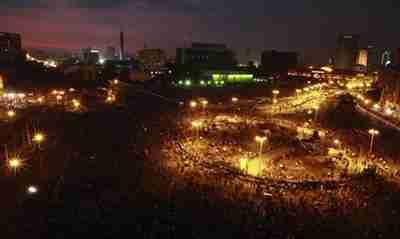 |
Tens of thousands of mostly youthful protesters poured into Tahrir Square in Cairo Egypt on Monday, with the number growing as the evening wore on. It was the biggest crowd since the January protests that forced Hosni Mubarak to step down. Protesters are calling this the "Second Revolution," because they now want the Supreme Council of the Armed Forces (SCAF) to "return to their barracks," and turn the job of governing over to civilians. However, street fights with security forces have killed 30 protesters and wounded more than 1,200, leading the entire civilian government to resign in protest. Egypt's first parliamentary election in living memory is scheduled for next week, but if the chaos continues then it may be necessary to cancel the election, leaving the army in full control. Bloomberg
Egypt's political parties and movements -- liberal, Islamist and leftist -- met on Monday to discuss the reaction to the latest round of violence. The Muslim Brotherhood's Freedom and Justice Party issued a statement saying, "The SCAF is fully responsible for what has happened in Tahrir Square," and demanded the prosecution of all police officers involved in killing protesters. Some 37 political parties, led by the Revolutionary Youth Coalition (RYC) called for a million-man protest in Tahrir Square on Tuesday to demand presidential elections by April, 2012. Al-Ahram
Pressure on the Egyptian pound has been growing since the overthrow of Hosni Mubarak. Egypt's net foreign reserves have tumbled from around US$36 billion at the start of the year to $22.1 billion in October. Reserves sank $1.93 billion last month, the biggest drop since April. The ouster of Mubarak has caused an exodus of foreign investors and tourists, and the new violence is likely to make things worse. Some traders think the market could panic, with expectations for currency depreciation causing bigger fund outflows that overwhelm the central bank. Al-Ahram
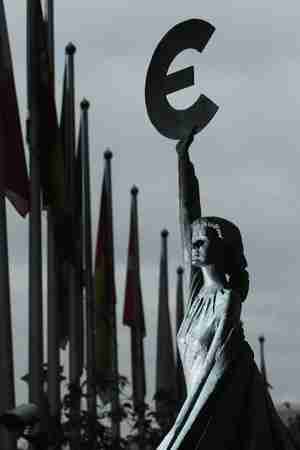 |
A report by Credit Suisse economists warned that EU leaders need to act by mid-January if they intend to save the euro. In a report titled The “Last Days” of the Euro, economists with Credit Suisse’s Fixed Income Research team warned that markets are no longer able to tolerate the foot dragging that EU leaders have demonstrated in the past year. They said action is needed now, or the monetary union is finished. "We seem to have entered the last days of the euro as we currently know it. The fate of the euro is about to be decided." Financial Post
MF Global Inc.’s shortfall in supposedly segregated customer accounts may exceed $1.2 billion, more than double what was previously expected. There is suspicion that customer funds were illegally commingled with company funds, and that both were lost because of bets that the European fiscal crisis would end quickly, resulting in bankruptcy. Former New Jersey Governor Jon Corzine, who ran the failed brokerage and hedge fund firm, is under investigation. Bloomberg
Jordan’s King Abdullah II arrived Monday in the West Bank for an unannounced visit, his first in more than 10 years. His purpose was to convince Palestinian Authority President Mahmoud Abbas to resume "peace process" negotiations with Israel. Abbas said he was ready to resume negotiations with Israel once it stopped building settlements in the West Bank and East Jerusalem and accepted the international guidelines for negotiations, but added that he does not see any “prospect that negotiations will resume any time soon.” Israel has stated that it will not stop building settlements. This situation is no different from the financial stalemates in Washington and Brussels. All of these governments are completely paralyzed, and that won't change until a major existential crisis (financial crisis or world war) strikes these nations. LA Times
In what some analysts are calling a disaster, more than a dozen spies working for the CIA in Iran and Lebanon have been caught, and the U.S. government fears they will be or have been executed. The spies were paid informants recruited by the CIA for two distinct espionage rings targeting Iran and the Lebanon-based Hezbollah terror organization. Some former intelligence experts are blaming the situation on sloppy intelligence work. The spies would repeatedly meet at the same Pizza Hut in Beirut, and once Hizbollah had discovered this, they were able to identify all the agents. ABC News
A convoy of buses carrying Turkish pilgrims from Saudi Arabia back to Turkey were attacked by Syrian soldiers as they passed through Syria. One pilgrim and the bus driver were wounded by gunfire that left numerous holes in the buses. Turkey's President Abdullah Gül played down the incident, and Prime Minister Recep Tayyip Erdogan has not yet commented on it. Turkey's government is increasingly torn between those who want Turkey's army to prevent further bloodshed in Syria, versus those who believe it would be dangerous for Turkey to get involved. Zaman (Istanbul)
(Comments: For reader comments, questions and discussion,
see the 22-Nov-11 World View -- Egypt under threat from 'Second Revolution' mass protest
thread of the Generational Dynamics forum. Comments may be
posted anonymously.)
(22-Nov-2011)
Permanent Link
Receive daily World View columns by e-mail
Donate to Generational Dynamics via PayPal
Congressional 'Super Committee' to announce failure
This morning's key headlines from GenerationalDynamics.com.
* Thousands clash with police in Tahrir Square in Cairo Egypt
* Congressional 'Super Committee' to announce failure
* Syria accuses the Arab League of being a 'tool' of the West
* Putin receives catcalls at Russia's judo championships
* Cambodian trial of 1970s 'Killing Fields' leaders begins
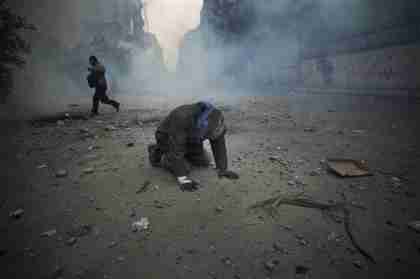 |
A week before Egypt's parliamentary elections are to take place, thousands of protesters have filled Tahrir Square in Cairo to demand that the Supreme Council of the Armed Forces (SCAF), led by Field Marshall Hussein Tantawi, turn government control over to civilians, after having run the government since Hosni Mubarak was forced to step down in February. Protests have been growing because of SCAF violence, but a huge protest was triggered this weekend because SCAF has tried to change the constitution to remove parliamentary oversight over the army, and to postpone presidential elections for two years. The Muslim Brotherhood has been staying out of protests this year, but this attempted SCAF power grab brought the Islamists into the square to join the protests. Hundreds of security personnel entered Tahrir square, shooting rubber bullets and teargas at protesters, killing 11 and injuring hundreds. NY Times
Aides to members of the Congressional Super Committee are saying that the committee members have stopped negotiating, and they're now focusing on how to announce failure, possibly on Monday. For the next few days, we'll be treated to the spectacle of Democrats and Republicans covering their asses and blaming each other, as if there's anyone left who even believes a word they say. It would be hilarious if it weren't so pathetic. This is the result predicted by the "Kick the Can Theory" that I proposed a few weeks ago. Now Congress will have to get down to its real job -- figure out a way to get the sequester kicked down the road. The "Kick the Can Theory" says that government is so paralyzed that every important decision will be postponed as long as possible, and that the paralysis will end only when a major crisis occurs that puts the survival of the nation in danger. (This is the "regeneracy" in generational theory.) CNN
Syria's foreign minister Walid al-Moualem has accused the Arab League, which has been trying to negotiate an end to the violence in Syria, of being a "tool" of the Western plan to take the Syrian crisis to the U.N. Security Council. He said that Arab League demands to monitor the violence in Syria go beyond their mandate and violate Syria's sovereignty. He said that tensions and violence have grown in Syria in the two weeks since the country had agreed to an Arab League plan to end the violence. Syria used to be considered the "heart" of the Arab League, but now the group increasingly at odds with the Bashar al-Assad regime, as the regime continues to torture and slaughter innocent Arab civilians. Al-Jazeera
 |
Russia's Prime Minister Vladimir Putin was greeted by catcalls when he stepped into the ring after a mixed martial arts fight at a Moscow arena on Sunday night. The whistles and shouts, heard clearly on the live television broadcast, were an unprecedented rebuke as Putin prepares to return to the presidency next year. Putin has been putting on a series of televised publicity stunts, including playing hockey and diving for sunken treasure, in order to prove to everyone that he's still not to old to be President, but Russians are beginning to show less tolerance. AP
After the U.S. was forced out of Vietnam in 1974, a massive genocide known as the "Killing Fields" began next door in Cambodia, with the Khmer Rouge slaughtering one quarter of the Cambodian population through starvation and executions. Now two top leaders of the Khmer Rouge are going on trial for war crimes, crimes against humanity and genocide. The survivors of the Killing Fields hope finally to get some answers about what happened and why. The supreme leader of Khmer Rouge, Pol Pot, died in 1998. Pol Pot, Josef Stalin, Adolf Hitler and Mao Zedong are considered by many to be the four bloodiest genocidal leaders of the twentieth century. AFP
(Comments: For reader comments, questions and discussion,
see the 21-Nov-11 World View -- Thousands clash with police in Tahrir Square in Cairo Egypt
thread of the Generational Dynamics forum. Comments may be
posted anonymously.)
(21-Nov-2011)
Permanent Link
Receive daily World View columns by e-mail
Donate to Generational Dynamics via PayPal
Remote cyber attack destroys pump in Illinois public water system
This morning's key headlines from GenerationalDynamics.com.
* Saif al-Islam Gaddafi captured in Libya
* Massive violence in Egypt may be a turning point
* Stuxnet virus suspected in last week's explosions in Iran
* Remote cyber attack destroys pump in Illinois public water system
* Bashar al-Assad vows to continue violence in Syria
 |
The man who went on worldwide television and promised to "fight to the last bullet" was captured on Saturday. When Saif al-Islam Gaddafi was asked his name, he answered, "Abdelsalam," meaning "Servant of Peace." But his Zintan captors recognized him anyway, and took him into custody. Saif is now a negotiating chip in the hands of the Zintan fighters and the Libyans. The International Criminal Court (ICC) wants him on charges of crimes against humanity, but the Libya's National Transitional Council (NTC) plans to try him in Libya, probably leading to his execution. But the Zintans are holding onto him in order to gain additional representation in the NTC. Reuters
A possible turning point in Egypt's "Arab Spring" revolution occurred on Saturday when security forces poured live fire into thousands of protesters demonstrating in Cairo against the military junta. Some 600 to 1000 people were injured, and at least two people were reported dead in a confrontation being compared to the "Day of Anger" on January 25 that led to the downfall of Hosni Mubarak. The protests were clearly directed at the army, and no sign of the brief violence that occurred weeks ago targeting Israelis or Coptic Christians. The demonstrators are claiming that Egypt under the army is returning to the harsh rule of Mubarak. Chants of "Down with the Field Marshall" were heard from thousands of people in Tahrir Square. Guardian and Bikya Masr (Egypt)
Seventeen personnel of the Islamic Revolution Guards Corps (IRGC) were killed by two huge explosions that occurred last week at an IRGC munitions depot about 30 kilometers west of Tehran, as we reported several times. Among the victims was Major General Hassan Tehrani Moqaddam, considered to be an architect of Iran's missile program. Reports from Iran have alternately said that the explosions were an accident, or that they were sabotage by Israel or the United States. But new findings by Iranian investigators suggest that the explosions were triggered by remote commands to Iranian computers infected with the Stuxnet virus. The Stuxnet virus is already responsible for months of delays in Iran's nuclear program. It's believed, but not confirmed, that the Stuxnet virus was created by Israel. Debka
Russian hackers apparently cyber attacked the Illinois public water system, damaging one of the pumps. The cyber attack targeted Industrial Control Systems or SCADA with the same characteristics as the systems in Iran's nuclear facilities that Stuxnet attacked. According to an initial report, "An information technology service and repair company checked the computer logs of the SCADA system and determined the system had been remotely hacked into from an Internet provider address located in Russia." These attacks on American utilities are expected to increase, and nothing is being done to prevent them. Washington Times
Syrian President Bashar al-Assad was quoted on Saturday as saying he would continue with a brutal a crackdown against anti-government unrest in his country. "The conflict will continue and the pressure to subjugate Syria will continue. However, I assure you that Syria will not bow down and that it will continue to resist the pressure being imposed on it," he said. This statement comes on the day set as the latest deadline by the Arab League to end the violence. Reuters
(Comments: For reader comments, questions and discussion,
see the 20-Nov-11 World View -- Massive violence in Egypt may be a turning point
thread of the Generational Dynamics forum. Comments may be
posted anonymously.)
(20-Nov-2011)
Permanent Link
Receive daily World View columns by e-mail
Donate to Generational Dynamics via PayPal
China and U.S. set to face off over South China Sea
This morning's key headlines from GenerationalDynamics.com.
* Britain's Cameron and Germany's Merkel agree on nothing
* Ireland worries, 'Germany is our new master'
* Washington Super Committee appears close to failure
* Syria claims to accept Arab League plan 'in principle'
* Britain in secret talks with Syria's opposition movement
* China and U.S. set to face off over South China Sea
* Concerns over rising settler 'price tagging' violence in the West Bank
 |
Britain's Prime Minister David Cameron traveled to Berlin on Friday to meet with German Chancellor Angela Merkel to solve the euro crisis. Britain is not a eurozone country, but Cameron doesn't want the euro countries making decisions without him, and Merkel wants the UK to contribute large sums to the eurozone for bailout purposes. They were all smiles and jokes on Friday, but they agreed on nothing. Here are the major areas of disagreement:
The next major deadline for the euro zone is December 9, when there will be a new European Summit. At that time, a final decision will have to be made whether to give Greece the next €8 billion bailout payment, and whether to take any other steps to try to stem the deterioration of Europe, which appears to worsen every day. According to the "Kick the Can Theory," we can expect the Greek payout to be approved, and little else. Guardian
Ireland's Finance Minister Michael Noonan has admitted that he provided details of Ireland's proposed new budget to the German parliament prior to releasing them to the Irish parliament. This has caused a huge firestorm in Ireland. But new German laws give its parliament the right to be fully informed about bailout countries' progress before new tranches of funds are paid out and Ireland's main opposition party led cries Germany was now calling the shots in Europe, saying, "Germany is our new master." Reuters
Stories being leaked out of negotiations of the Congressional Super Committee indicate that it's deadlocked, and that the sequestration option will come into play after Wednesday's deadline has passed. In the 1980s, when the Silents were in charge, it was possible for Democrats and Republicans to get together and agree on measures to save social security and reduce the deficit. However, no such agreements are possible today in Washington's Gen-X/Boomer culture of fraud and extortion. According to the "Kick the Can Theory," the Super Committee will do nothing, and will leave it to next year's Congress to repeal the sequestration provisions. CS Monitor
Wednesday's Arab League meeting imposed a new deadline on Syria. The Bashar al-Assad regime was given until Saturday to agree to allow Arab League observers into the country to verify whether the regime is still slaughtering civilians. The Syrians say that they've accepted the plan "in principle," but Arab League demanded approval for 500 observers, while Syria is willing to approve only about 40. The Arab League says that it's "studying" the Syrian counter proposal, but Syria has very little credibility left, if any. International opinion has been increasingly turning against Syria, with harsh statements by leaders in Turkey, France and Britain. However, politicians in other countries, particularly Russia, China and Israel, are pointing out that the fall of Assad might lead to chaos that would be much worse than the current situation. CNN
Senior British officials are meeting with members of the Syria's opposition groups, including the Syrian National Council and the National Co-ordination Committee for Democratic Change, to talk about the rebels eventually supplanting the Assad regime, and being recognized as Syria's government. This appears to be similar to what happened in Libya, but it's not according to British officials. "This is not about recognition of them as the government – that is not the case. The difference with the Libyan situation was that the Libyan National Transitional Council controlled swathes of the country. We are asking the Syrian opposition to present a coherent set of policies and organize themselves." The British, French and Turks are planning to bring the Syria matter to the U.N. Security Council. Independent
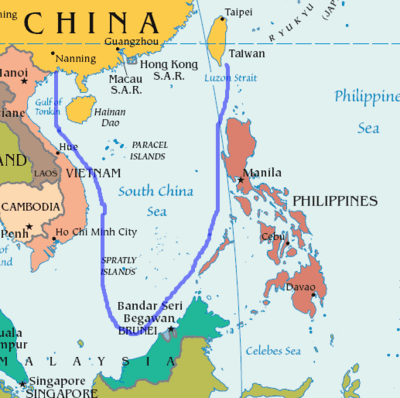 |
The United States and China are set to face off on Saturday at the East Asia Summit over China's claims to enormous regions of the South China Sea as its own sovereign territory. This includes the Spratly and Paracel Islands and other areas that have long been considered sovereign territory of other nations, including Vietnam, the Philippines, Taiwan, Malaysia and Brunei. The U.S. does not take sides in any of the individual disputes, but insists that the South China Sea must remain freely open for commercial and military ship traffic, something that China also opposes. China wants to resolve these issues in a "bilateral" fashion, meaning that it would negotiate with each country separately, with no interference from the U.S. But the U.S. and the east Asian nations want to negotiate in a "multilateral" fashion, meaning that China has to negotiate with all of them as a group. Relations between the U.S. and China have been growing more and more tense, because of China's increasingly aggressive claims to the South China Sea, and they took an additional leap forward in tension this week, when President Obama announced that some U.S. armed forces will be stationed in Australia with the specific purpose of countering China's aggressive military buildup. Reuters
The United Nations says the number of attacks by extremist Jewish settlers on Palestinians resulting in either injury or damage to property has roughly tripled since 2009. So far in 2011 around 10,000 Palestinian-owned olive trees have been destroyed or damaged in attacks by settlers. The phrase "price tag" is frequently used by radical Israeli settlers to denote revenge attacks against Palestinians in response to moves by the Israeli government to evacuate illegal West Bank outposts, or as retribution for attacks by Palestinians. Typically price tagging happens after the Israeli authorities move to dismantle settler "outposts", small Jewish communities build on occupied Palestinian land which even the Israeli government regards as illegal. BBC
(Comments: For reader comments, questions and discussion,
see the 19-Nov-11 World View -- Financial crisis deadlocks in Berlin and Washington
thread of the Generational Dynamics forum. Comments may be
posted anonymously.)
(19-Nov-2011)
Permanent Link
Receive daily World View columns by e-mail
Donate to Generational Dynamics via PayPal
Obama's Australia announcement considered a 'betrayal' by China
This morning's key headlines from GenerationalDynamics.com.
* Obama's Australia announcement considered a 'betrayal' by China
* MF Global bankruptcy begins to claim victims
* Barnhardt Capital Management closes because of MF Global outcome
* News site 'Politico' approves fraud by lawmakers
* Protesters attack U.S. Embassy in Athens, Greece
* IMF has not yet approved next €8 billion bailout payment to Greece
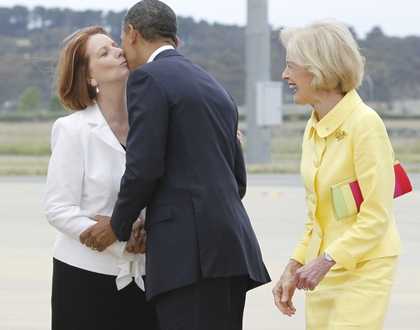 |
President Obama's announcement in Australia of stationing of American armed forces in Australian bases to counter China's growing military strength will be viewed by many Chinese as a betrayal of the promise of "constructive partnership" that Obama and China's president Hu Jintao agreed on in a meeting in January. China's Global Times alleged the U.S. was seeking to weaken China by nurturing hostile forces within the country while wrecking Beijing’s relations with its neighbors. It suggested Beijing reduce its massive purchases of U.S. government debt — which have helped keep U.S. interest rates low — to get Washington to stop meddling in the South China Sea, where China is asserting claims to islands, reefs and atolls contested by five other governments. AP
A U.S. bankruptcy court judge ruled on Thursday that about 60% of the money they had in cash accounts managed by MF Global Holdings, at the time that the hedge fund firm declared bankruptcy three weeks ago, will be returned to them. According to law, they should have immediately received 100% of the money, since customers' cash is supposed to be segregated from company cash. However, $600 million has disappeared, and suspicion has fallen on the CEO, former Democratic New Jersey governor and Obama administration superstar Jon Corzine, who is suspected of losing the $600 million after illegally co-mingling company and customer funds. Corzine had invested his firm's money heavily on European bonds, betting that the European financial crisis would be solved by now. But as it worsens, MF Global went bankrupt. Bloomberg
I've been advising readers for years to stay out of the markets, because they're far too dangerous for any but the most sophisticated investors -- and probably even for sophisticated investors. That's because today's culture of fraud and extortion is not for honest people. Ann Barnhardt has echoed these warnings in a letter that she sent to her customers:
"It is with regret and unflinching moral certainty that I announce that Barnhardt Capital Management has ceased operations. ...The reason for my decision to pull the plug was excruciatingly simple: I could no longer tell my clients that their monies and positions were safe in the futures and options markets – because they are not. And this goes not just for my clients, but for every futures and options account in the United States. The entire system has been utterly destroyed by the MF Global collapse. Given this sad reality, I could not in good conscience take one more step as a commodity broker, soliciting trades that I knew were unsafe or holding funds that I knew to be in jeopardy.
The futures markets are very highly-leveraged and thus require an exceptionally firm base upon which to function. That base was the sacrosanct segregation of customer funds from clearing firm capital, with additional emergency financial backing provided by the exchanges themselves. Up until a few weeks ago, that base existed, and had worked flawlessly. Firms came and went, with some imploding in spectacular fashion. Whenever a firm failure happened, the customer funds were intact and the exchanges would step in to backstop everything and keep customers 100% liquid – even as their clearing firm collapsed and was quickly replaced by another firm within the system.
Everything changed just a few short weeks ago. A firm, led by [Jon Corzine], stole all of the non-margined cash held by customers of his firm. Let’s not sugar-coat this or make this crime seem “complex” and “abstract” by drowning ourselves in six-dollar words and uber-technical jargon. Jon Corzine STOLE the customer cash at MF Global. ...
I have learned over the last week that MF Global is almost certainly the mere tip of the iceberg. There is massive industry-wide exposure to European sovereign junk debt. While other firms may not be as heavily leveraged as Corzine had MFG leveraged, and it is now thought that MFG’s leverage may have been in excess of 100:1, they are still suicidally leveraged and will likely stand massive, unmeetable collateral calls in the coming days and weeks as Europe inevitably collapses. I now suspect that the reason the Chicago Mercantile Exchange did not immediately step in to backstop the MFG implosion was because they knew and know that if they backstopped MFG, they would then be expected to backstop all of the other firms in the system when the failures began to cascade – and there simply isn’t that much money in the entire system. In short, the problem is a SYSTEMIC problem, not merely isolated to one firm."
Barnhardt's remarks apply to the futures markets, but the stock market is becoming equally dangerous, because of the same culture of fraud and extortion. Ordinary people should focus on preserving assets, keeping money in their homes or in FDIC insured bank accounts.
I omitted from my excerpts of Barnhardt's statement her remarks about "the abject lawlessness and contempt for humanity" of the Obama administration -- not because her remarks aren't true, but because they apply to pretty much every politician and banker these days, in Washington, New York, Brussels, and elsewhere. Zero Hedge
Even by non-existent Washington media standards, I was startled by the Politico news site story that condones insider trading by Congress, saying that the accusations are a right-wing conspiracy.
I've written many times how much the culture has changed since the 1990s, when the Silent Generation (survivors of WW II) disappeared, and Generation-Xers reached middle management positions in the mid-2000s decade. It's not that all Gen-Xers are crooks; the vast majority are honest. But they've created the culture of fraud and extortion that we've been experiencing by refusing to criticize almost any Gen-Xer for any crime, no matter how egregious. This has been apparent in books on the financial crisis by Mike Taibbi and others that document massive fraud by Gen-Xers in financial institutions, but never actually blame any of them, somehow painting them as victims, despite the crimes they've committed. The difference between the Silents and the Gen-Xers is that most Silents had morals and ethics, and many Gen-Xers apparently do not.
During the 1980s savings and loan crisis, thousands of people were criminally referred by regulators, while during this crisis, which is many times bigger, there have been almost none. That's the difference between the Silents and the Gen-Xers. There's been only one criminal conviction: Raj Rajaratnam has been convicted of insider trading and sentenced to 11 years in jail. (Bloomberg)
This brings me back to the Politico article that I referenced above.
Massive insider trading by Congressmen and Senators of both parties was exposed earlier this week on CBS's show 60 Minutes, when BigPeace editor Peter Schweizer revealed his research that shows how they used inside information on secret lawmaking negotiations to line their pockets with huge profits in the stock markets. Even though they should be given jail sentences like Raj Rajaratnam's, they're free to do what they want because Congress has exempted itself from the insider trading laws. They can commit all the crimes they want without fear of criminal prosecution. They can buy stocks on Monday and then pass a law on Tuesday that causes the stock price to triple. It's all perfectly legal.
But to the Gen-Xers at Politico, Schweizer's work is a vast right-wing conspiracy. The politicians who take our money and screw us are just innocent victims of Schweizer and his right-wing buddies, according to Politico.
Politico's article is one of the sleaziest I've seen, and that's saying a lot because there's a hell of a lot of sleaze in the mainstream media. Politico
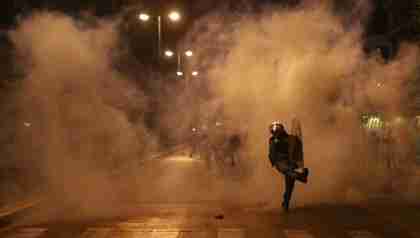 |
Some 30,000 people took to the streets in Athens on Thursday, in commemoration of the 38th anniversary of the ultra-right junta of the "Black Colonels." Most demonstrations protested Greece's austerity program, demanded by the European Union and International Monetary Fund as conditions to receive the next €8 billion bailout payment. Several hundred protestors attempted to storm the U.S. Embassy but were stopped by police, after which tensions grew between the two opposing sides and involved Molotov cocktails from the protestors and tear gas from the police. The protesters were mostly communists who blame the United States for supporting the "Black Colonels" in their suppressing a university students' uprising on November 17, 1973. The communists demand that Greece secede from the eurozone and that communism be reinstated in the country. Ria Novosti
Greece's interim Prime Minister Lucas Papademos has won a vote of confidence from the parliament, and is now trying to get approval for the austerity budget required by the EU and the IMF to receive further bailout money. The IMF has stated that another condition is that the austerity measures must have strong political support from all parties. However, the next €8 billion bailout payment has been put into question because Antonis Samaras, Greece’s main opposition leader, has balked at signing a separate letter pledging commitment to austerity measures requested by EU officials, saying his support for the transitional government is enough. Bloomberg
(Comments: For reader comments, questions and discussion,
see the 18-Nov-11 World View -- MF Global bankruptcy begins to claim victims
thread of the Generational Dynamics forum. Comments may be
posted anonymously.)
(18-Nov-2011)
Permanent Link
Receive daily World View columns by e-mail
Donate to Generational Dynamics via PayPal
Russia's rapprochement with Iran openly violates US/UN sanctions
This morning's key headlines from GenerationalDynamics.com.
* Arab League confirms suspension of Syria, threatens economic sanctions
* Syrian Embassy in Amman under heavy security to prevent reprisal action
* The 'Free Syrian Army' grows in influence
* As China prepares for war, U.S. increases military presence in Pacific
* Chinese investors take advantage of Greek crisis
* Wall Street tanks after Fitch warns of U.S. exposure to Europe
* Iran now says that Saturday's explosions were not Israeli sabotage
* Russia's rapprochement with Iran openly violates US/UN sanctions
* Palestinians may hold parliamentary and presidential elections in May
* Request for help with public relations
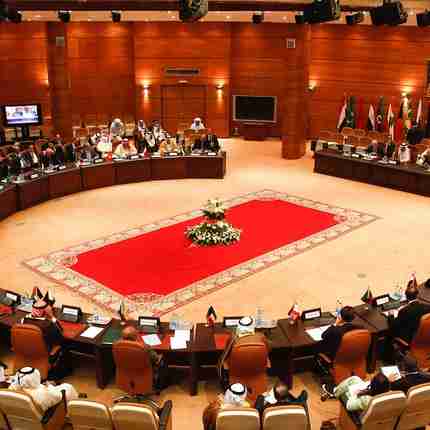 |
The Arab League confirmed the suspension of Syria from the organization on Wednesday and gave the Bashar al-Assad regime three days to halt the violence and accept an observer mission or face economic sanctions. The normally toothless Arab League is gaining kudos for being tough on Syria. Qatar's Foreign Minister Hamad bin Jassim has apparently been leading the effort to condemn and sanction Syria. "The Syrian government has to sign the protocol sent by the Arab League and end all violence against demonstrators," he said, adding that it has three days. "Economic sanctions are certainly possible, if the Syrian government does not respond. But we are conscious that such sanctions would touch the Syrian people. The Arab League statement added, "In the light of insulting and undiplomatic words of the permanent Syrian representative, the Arab League is asking the Syrian government to withdraw its representative." This is going to infuriate the Syrian regime and its supporters in the region. AP
Security has been beefed up around Syria's embassy in Amman, Jordan, as a precautionary measure, after hundreds of Jordanians tried to storm the building in retaliation for an assault on the Jordanian Embassy in Damascus. On Monday, about 100 Syrians staged a protest in front of the Jordanian diplomatic mission in Damascus on Monday and shouted "offending slogans," Foreign Ministry spokesman Mohammad Kayed said. He said that three of them climbed the building’s walls and brought down the Jordanian flag. Arab News
The attack early Wednesday morning by the Free Syrian Army (FSA) on a regime air force intelligence base near Damascus has raised the profile of the band of army defectors, numbering between 1,000 and 25,000, depending on whom you believe. However, they stand little chance against the regime's 500,000 strong army. Al-Jazeera
At a meeting in Canberra, Australia, American president Barack Obama and Australian Prime Minister Julia Gillard announced an agreement on Wednesday for America's marines and Air Force to make greater use of Australian military bases. Beginning next year, the U.S. will be stationing military aircraft and hundreds of marines in Australia, building to a full force of 2,500 marines by 2016. This is becoming necessary because China has developed anti-ship ballistic missiles that may soon make aircraft carriers obsolete. (See "New Pentagon report outlines China's military buildup" from August.) In Australia, the troops will be out of reach of China's missiles, but near enough to Taiwan to make a difference when China's inevitable invasion occurs. CNN and New Zealand Herald
The Chinese are willing to help Europe, but they're enforcing their own austerity program. For example, Greece received €3.4 billion 18 months ago from China for the rights to the Piraeus container port. But they've laid off 250 people, and instead of employing experienced dockworkers at the going rate of €120 a day, they hire only unskilled laborers for €40-50 a day, without overtime pay for night or weekend work, and without any guarantee of employment. This is not popular with the labor unions. Spiegel
According to Fitch ratings service, "Exposures to large European governments and banks are sizable," and that "unless the eurozone debt crisis is resolved in a timely and orderly manner," [which has a zero percent chance of happening - JX], the stable ratings outlook for U.S. banks "will darken" from the agency’s base cast, which does not account for a disorderly debt restructuring or the departure of any countries from the euro. Wall Street stock prices were holding fairly steady until mid-afternoon, and then plummeted when Fitch's report came out. Bloomberg
We've been reporting about two huge explosions near Tehran on Saturday that killed 17 personnel of the Islamic Revolution Guards Corps (IRGC), including Iran's chief missile expert. There have been and continue to be rumors and unconfirmed reports that the explosions were caused by sabotage by either Israeli or American special forces. But now Maj. Gen. Hassan Firouzabadi told reporters on Wednesday that explosion "is not related to Israel or America." However, there are conflicting stories about the number of explosions, and what kind of accident actually caused them. LA Times
An intense schedule of intense high-level visits between Iran and Russia since August are signs of a rapprochement between the two countries. Russian energy, zinc, and aluminum companies are all planning to risk violating US sanctions by cooperating with Iran and Prime Minister Vladimir Putin’s spokesman, Dmitry Peskov, openly said that unilateral US sanctions are not binding under international law and that many other countries also have ties with Iran. Furthermore, Iran is actively holding talks with Russia to build new nuclear reactors after the opening of the reactor at Bushehr. India is paying for its Iranian oil through a bank in Russia as a way of making an end run around UN and US sanctions. This appears to be consistent with my oft-stated expectation that Iran will side with India, Russia, the U.S. and the West against China, Pakistan and the Sunni Muslim countries in the approaching Clash of Civilizations world war. Jamestown
Barring a last-minute surprise, next weekend will see a historic agreement between Palestinian President Mahmoud Abbas and Khaled Meshal, head of Hamas' political bureau. The two are expected to set parliamentary and presidential elections for May, six years after the last parliamentary elections, and seven years since Abbas was elected. The meeting is scheduled to take place in Cairo, under the auspices of Egyptian intelligence. Until recently, Hamas too was wary of elections, but the Gilad Shalit deal has strengthened its standing. Haaretz
I'd like to ask for a volunteer to help with public relations. Specifically, I'd like someone to call up colleges and clubs and media and other venues in the Boston area and arrange speaking opportunities. I don't have any money to pay you for this (Generational Dynamics is a public service, and I don't make any money from it myself), but any help will be appreciated.
(Comments: For reader comments, questions and discussion,
see the 17-Nov-11 World View -- As China prepares for war, U.S. increases military presence in Pacific
thread of the Generational Dynamics forum. Comments may be
posted anonymously.)
(17-Nov-2011)
Permanent Link
Receive daily World View columns by e-mail
Donate to Generational Dynamics via PayPal
Qatar accused of arming opposition, as Syria violence escalates
This morning's key headlines from GenerationalDynamics.com.
* Turkey's Erdogan threatens 'response' to Syria's embassy attack
* Over 70 killed in Syria's bloodiest day
* Qatar accused of arming opposition, as Syria violence escalates
* Defectors in the Free Syrian Army attack regime intelligence complex
* Germany's economy dominates Europe, as bond rout expands
* German official clashes with UK, saying, 'Now Europe is speaking German'
* Deadlocked Congressional 'Super Committee' agree to freeze time
* Islamist terrorist threat grows in Kazakhstan
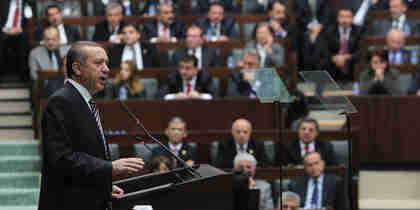 |
Turkey's Prime Minister Recep Tayyip Erdogan used his bluntest language yet against Syria's president Bashar al-Assad, even addressing him directly by his first name, following regime-sanctioned attacks on Turkey's embassy in Latakia on Saturday:
"Bashar, you who have thousands of people in jail, must find those who attacked the Turkish flag and punish them.I want to make this clear to the Assad regime: Throughout history, those who have tried to touch the Turkish flag were given their response. They will receive a response in the future as well. Once again, we strongly condemn these attacks. We want the Syrian regime not only to apologize, but also to find the culprits. ... Those who fire on their own people will go down in history as leaders who feed on blood. You are on the same path. ...
Nobody now expects the (Syrian) people's demands to be met. We all want the Syrian administration, which is now on a knife-edge, to turn back from the edge of the cliff."
More than 70 people died in one of the bloodiest days of Syria's eight month uprising, activists said on Tuesday, as president Bashar al-Assad's loyalists reacted angrily to the growing harsh criticism from other Arab and Turkish leaders. Around 100 of his supporters stormed the Jordanian embassy in Damascus overnight, after Jordan's King Abdullah II became the first Arab leader to publicly call for Assad to quit. The Assad regime has announced that it will not send a representative to the Arab League meeting on Wednesday, the date of the deadline that was set for Assad to end the violence against protesters. This makes it certain that the suspension will go ahead. AFP
The escalating violence in Syria comes amid reports that Qatar is supplying money and arms to the regime's opposition, a claim that the Qataris deny. However, Qatar has taken a leading role in getting the Arab League to suspend Syria, a symbolic act that's taken on huge significance. Independent
Syrian army defectors attacked an intelligence complex on the edge of Damascus early on Wednesday, in the first reported assault on a major security facility in the eight-month uprising. Members of the Free Syrian Army fired shoulder-mounted rockets and machine guns at a large Air Force Intelligence complex situated on the northern edge of Damascus. A gunfight ensued and helicopters circled the area. Reuters
The international situation with respect to Syria is becoming more dangerous every day. When comparing Libya with Syria, there's an interesting irony. In Libya, the West established a no-fly zone and supported the rebels, with the consent and approval of the Arab League, with the result that the Libyan action was kept under control. But it's pretty clear that the West will not be establishing a no-fly zone over Syria, and will participate little or not at all in a Syrian military action launched by countries like Turkey and Qatar, if one occurs. Without the "calming" influence of the West, it's quite possible that such a military action, if it occurs, will spiral into a regional war. Indeed, Bashar al-Assad has already promised that he will make sure that it happens.
Bond prices in countries across Europe plummeted on Tuesday, pushing bond yields (interest rates) to crisis levels. It's no longer a crisis confined to Greece and Italy; it's now Europe itself that's beginning to experience full scale panic -- almost everywhere except in Germany. The problem is illustrated by the following charts:
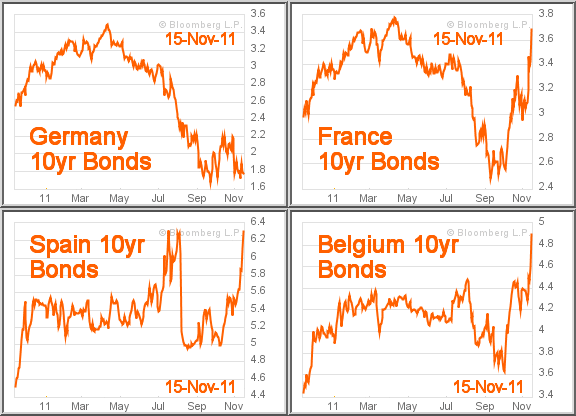 |
Germany is remaining a tower of strength, but bond prices in France, Spain and Belgium are crashing, pushing yields up to crisis levels, indicating a full-scale panic. Italy's bond yields are above 7% again. Even countries like Norway and Finland are experiencing increases in bond yields, though they're still relatively low compared to the others.
The crash in France's bonds is particularly dangerous, as France is considered the strongest economy in Europe, along with Germany. France has been desperate to preserve its AAA rating, but that may now be in jeopardy. Bloomberg
Volker Kauder, a senior member of German Chancellor Angela Merkel's conservative Christian Democrats (CDU) party said that Germany's fiscal policies had become a model for the rest of Europe. "Suddenly Europe is speaking German," he said. Kauder added that the UK, as a member of the EU "also carries a responsibility for the success of Europe. Just looking for their own advantage and not being prepared to contribute -- that cannot be the message we accept from the British," he said, referring to Britain's opposition to the financial transaction tax that Germany has been lobbying for in order to raise revenue for future bank bailouts. Britain derives 30% of its economic output from the City of London financial center, and would lose some of that benefit with a financial transaction tax. Germany and Britain are headed for a major collision on this issue, as Merkel has been quoted as saying that she won't let the U.K. "get away" with its refusal to back a financial transaction tax, and British Prime Minister David Cameron dismissed the "utopian" idea, pointing out that 80% of the money collected on the tax would come from Britain. Spiegel and Bloomberg
As the deadlocked Congressional "Super Committee" tries to follow Europe's example, the desperate members may have found a way to kick the can down the road. Reports indicate that the members have agreed to freeze time on November 22, so that the deadline date of November 23 never happens. Huffington Post (Satire)
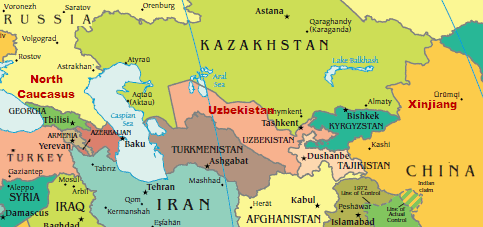 |
Kazakhstan was once depicted as an island of stability invulnerable to the encroachments of Islamist extremists. However, a recent series of such attacks have forced Kazakh officials to at least partially abandon their blissful state of denial. In May of this year, the first warning came from the Taliban who accused Kazakhstan of supporting NATO forces in Afghanistan. It appears that Islamist extremists are not only targeting the power structures, trying to frustrate government institutions, but also they are attempting to disrupt economic ties between Kazakhstan and western companies, by attacking the oil-producing infrastructure. Jamestown
(Comments: For reader comments, questions and discussion,
see the 16-Nov-11 World View -- Germany's economy dominates Europe, as bond rout expands
thread of the Generational Dynamics forum. Comments may be
posted anonymously.)
(16-Nov-2011)
Permanent Link
Receive daily World View columns by e-mail
Donate to Generational Dynamics via PayPal
Spain appears next in line to be attacked in bond market
This morning's key headlines from GenerationalDynamics.com.
* Iran blames Israel's Mossad for massive explosion on Saturday
* Syria's Assad sanctions mob attacks on embassies of Turkey and Qatar
* Jordan's King Abdullah says that Assad must step down
* Furious Turkey demands apology for attacks against its embassy
* Syrian athletes will boycott Arab games in Qatar
* Spain appears next in line to be attacked in bond market
* China claims new territory in the South China Sea
* Germany shocked by a new form of Neo-Nazi terrorism
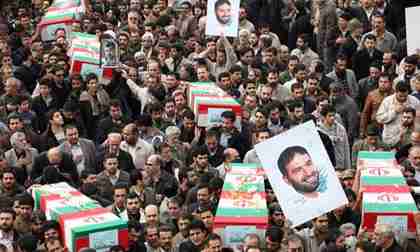 |
Seventeen personnel of the Islamic Revolution Guards Corps (IRGC) were killed by two huge explosions that occurred on Saturday at an IRGC munitions depot about 30 kilometers west of Tehran, as we reported two days ago. Among the victims was Major General Hassan Tehrani Moqaddam, considered to be an architect of Iran's missile program, a man so important that the funeral was attended by the Supreme Leader, Ayatollah Ali Khamenei. Iran has officially declared that the explosions were an accident, but some investigators now believe that they were deliberate sabotage by agents of Israel, aimed at halting Iran's missile program. Guardian
When the Arab League "suspended" Syria on Saturday, it seemed like a relatively empty gesture -- they were suspending unnamed Syrian "activities," and the suspension wouldn't take effect until Wednesday. However, this has been the League's most dramatic move since it expelled Egypt in 1979 for signing a peace treaty with Israel, though it was readmitted a decade later. And the new suspension is dramatic enough to be causing a great deal of turmoil among the Arab states. The regime of Syria's president Bashar al-Assad expressed fury at the suspension by sanctioning mob attacks on the Damascus and Latakia embassies of Qatar, Saudi Arabia, Turkey and France. Day Press (Syria)
Abdullah became Jordan's leader when his father died, at about the same time that Bashar al-Assad became Syria's leader when his own father died. So the two leaders have had a close relationship. So it was a surprise on Monday when Jordan's King Abdullah told the BBC that "If Bashar has the interest of his country [at heart] he would step down." However, Abdullah expressed concern about the stability of Syria after Assad. "If I were in his shoes, I would step down. I would step down and make sure whoever comes behind me has the ability to change the status quo that we’re seeing." BBC
After condemning the bloody attacks on protesters in Syria as "state terror [that] the whole world is following with feelings of hatred," Turkey's Deputy Prime Minister Bülent Arinç said, "Turkey is expecting a formal apology through diplomatic channels," for the embassy attacks. The statement made Syria the third country after Israel and Armenia that Turkey is expecting an apology from over tensions in bilateral ties. However, Turkey is not planning any immediate unilateral sanctions against Syria in the absence of a U.N. Security Council resolution. Hurriyet
In further retaliation for the Arab League suspension, the Syrian Olympic Committee announced that Syria will boycott the upcoming Arab Games, to take place in Qatar in December. The statement said that the Arab League's decision to suspend the membership of Syria which founded and supported the organization marks a dark spot in its history, stressing that the conspiracy against Syria aims at subjugating it to the United States and undermining its unity and stability. Day Press News
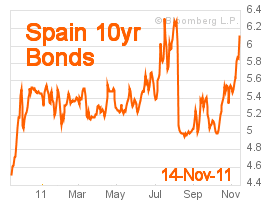 |
EU officials had hoped that new "technocrat" governments in Greece and Italy would restore investor confidence in euro, but there was little sign of that on Monday. Bond yields (interest rates) for Italy initially went down, but they rose again to unsustainable levels. And Spain appears to be next in line to be pressured in the bond market, as its 10-year bond yields also reach unsustainable levels at 6.106%. Spain's bond yields had reached 6.3% just before the July 21 bailout of Greece, after which they fell sharply to 5%. But now they're increasing again. Many analysts are saying that the only thing that can save Spain (and the euro) is for the European Central Bank (ECB) to "print money" and use it to purchase massive amounts of Spanish bonds. This step is under consideration, but the Germans oppose it and it apparently violates the European Union's Lisbon Treaty. Reuters
China has claimed new territory less than 50 miles (80 kilometers) from a Philippine province, boosting tensions over potentially resource-rich areas of the South China Sea, but the Philippines has dismissed the claim. Beijing has been asserting its territorial claims more aggressively as its economic and diplomatic muscle has grown. Its new claims are likely to bolster Philippine resolve to seek a U.N. ruling on the long-simmering disputes, which involve China, the Philippines and four other claimants. Among the areas being contested are the Spratlys, a chain of up to 190 islands, reefs, coral outcrops and banks believed to be sitting atop large deposits of oil and natural gas, which many fear could be Asia’s next flash point for conflict. AP
 |
German police have stumbled across evidence of a case that is unprecedented in the history of postwar Germany: a series of murders apparently committed by neo-Nazi killers, stemming from a white-hot rage against foreigners, and yet committed with such ice-cold precision that it took investigators an entire decade to finally track down the group. During the decade they murdered and injured dozens of Turks and Greeks, and funded their activities through bank robberies. There is no precedent in German postwar history for an underground right-wing combat group that funds itself through bank robberies and plans and commits deadly attacks, defying the authorities' attempts to stop them using manhunts, informants and state-of-the-art surveillance technology. In fact, this sort of terrorism has until now only been associated with a group operating on the other side of the political spectrum, the Red Army Faction (RAF). Spiegel
(Comments: For reader comments, questions and discussion,
see the 15-Nov-11 World View -- Mideast turmoil increases after Arab League suspends Syria
thread of the Generational Dynamics forum. Comments may be
posted anonymously.)
(15-Nov-2011)
Permanent Link
Receive daily World View columns by e-mail
Donate to Generational Dynamics via PayPal
Russia's Circassian problem grows on approach of 2014 Sochi Olympics
This morning's key headlines from GenerationalDynamics.com.
* 2009: 'Super Mario' Monti says that EU faces existential crisis
* Hope that new governments in Greece and Italy will stop EU deterioration
* Russia's president Medvedev warns against cutting eurozone
* Russia's Circassian problem grows on approach of 2014 Sochi Olympics
* Jihadists from Caucasus, Uzbekistan and Xinjiang linking up
* Peter Schweizer exposes massive Washington corruption on '60 Minutes'
* Berlusconi: 'I am the Jesus Christ of politics'
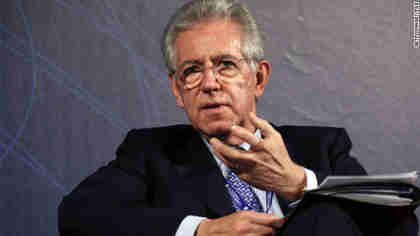 |
Italy's new interim prime minister "Super Mario" Monti was saying in 2009 that the global financial crisis has inflicted such damage to free market principles that it risks undermining the core function of Brussels and triggering the disintegration of the European Union:
"The EU faces a quasi-existential crisis. The special role played by the Commission in EU integration is based on the market, and this crisis has brought the market economy itself into crisis. It has lost respectability. This threatens to tip the Community into disintegration.We have seen an extremely bad example from the world champions, the US, and the UK, which generated this crisis by years of mistakes and lack of rule enforcement.
The speed with which they ditched free-market principles in a matter of weeks was remarkable. The UK spoke of 'British workers for British jobs'. The policy reflexes have become national again.
The year 2011 has been remarkable -- the Arab spring, the deterioration of Europe and the eurozone, the rise of left-wing violence in Europe and America, and the financial deterioration of America are just a few of the things that show a world changing more and more rapidly, careening to a new destination not yet understood. In the last week alone, the financial crisis has collapsed two European governments, with new unelected leaders in both Greece and Italy. EU officials in Brussels have been blaming the deterioration of the eurozone on "greedy Anglo-Saxon speculators," and are hoping that these changes in government will "restore confidence." However, officials in Germany's government now believe that Greece's exit from the eurozone will strength the euro in the long term, and so German lawmakers are preparing for Greece’s departure from the common currency in case the new government doesn’t commit to carrying forward reforms. Bloomberg
Russia's President Dmitry Medvedev indicated that expelling Greece from the eurozone would cause "irreparable damage." Almost half of Russia's currency reserves are in euros. "If the number of euro zone countries is reduced, it does not mean it will make the euro a more stable currency. ... We are fans of the euro and of the euro economy." Bloomberg
On November 7, the European parliament in Brussels observed Circassian Day, focusing on the increasing activism of Circassians in Europe. The Circassian issue continues to gain increasing international attention because of the 2014 Winter Olympics to take place in the Black Sea resort of Sochi. However, as I first reported a year ago, Sochi is claimed by the Circassians as their terrority, and it is the site of a well remembered major battle between Circassians and Russians in 1864, a battle that the Circassians claim was a Russian genocidal killing of Circassians. Russia’s reaction to the increased awareness of the Circassian issue has been mixed. Some officials have dismissed Circassian claims or made gestures of accomodation, while The Russian military quietly has relocated a brigade into the region near Sochi, apparently to strengthen the Russian military presence in the northwestern Caucasus to protect the Sochi Olympic from possible attacks. It is open to question, however, how effective the military would be against a terrorist attack by Circassian activists. Jamestown
 |
With both the Islamic Movement of Uzbekistan (IMU) and North Caucasus (NC) militant groups suffering from devastating manpower losses, some Uzbek analysts and security officers project the two extremist groups will pair up. In 1944, Soviet authorities deported about 500,000 residents of the North Caucasus, including Chechens, Ingush, Circassians, Balkarians and Azeris, to Central Asia, citing fears of wartime disloyalty. The exiled populations lived there until 1989, when they began returning to their ancestral homelands as the Soviet regime collapsed. Now the two groups are finding common ground, and are receiving training in Pakistan's tribal areas, as well as in the Caucasus. Furthermore, the Muslim Uyghur separatists in China's northwest Xinjiang province are also linking up, demanding that Xinjiang become Uyghur Autonomous Region of China. Central Asia Online
Appearing on CBS's show 60 Minutes on Sunday, BigPeace editor Peter Schweizer revealed his research that shows that Congressmen and Senators of both parties are using inside information on secret lawmaking negotiations to line their pockets with huge profits in the stock markets. Ordinary people would go to jail for insider trading for this sleazy behavior, but Congress has conveniently exempted itself, allowing it to commit crimes and enrich themselves on a daily basis and get away with it. CBS 60 Minutes
Now that Italian Prime Minister Silvio Berlusconi has been forced out of office, and is being blamed as a buffoon and a thief, people are recalling some of their favorite Berlusconi quotes, including the following:
(Comments: For reader comments, questions and discussion,
see the 14-Nov-11 World View -- Hope that new governments in Greece and Italy will stop EU deterioration
thread of the Generational Dynamics forum. Comments may be
posted anonymously.)
(14-Nov-2011)
Permanent Link
Receive daily World View columns by e-mail
Donate to Generational Dynamics via PayPal
17 Revolutionary Guards killed in massive explosions at munitions depot in Iran
This morning's key headlines from GenerationalDynamics.com.
* In bitter defeat, Berlusconi resigns as Italy's prime minister.
* Arab League sort-of suspends Syria's membership
* Clashes escalate among Libya's tribal militias near Tripoli
* Niger grants asylum to Saadi Gaddafi
* 17 Revolutionary Guards killed in massive explosions at munitions depot in Iran
* Yemen's vice president warns of 'hunger revolution'
* ABC TV show 'Pan Am' covers difficult issues in depth
 |
Italy's Prime Minister Silvio Berlusconi has survived in office since 1994 through numerous sex scandals and charges of corruption, but he couldn't find a way to avoid becoming the latest victim of the euro debt crisis. Many Italians are blaming him personally for the country's economic problems, resulting in the loss of a parliamentary majority that forced him to resign. Large crowds gather to shout insults -- calling him a buffoon and a Mafioso. Some made fun of his alleged "bunga bunga" parties with underage girls. Former European Commissioner Mario Monti looks set to gain the president’s approval as a new technocrat prime minister. His responsibility will be to stabilize the economy so elections can be held, likely early next year. VOA
At first it seemed that the normally toothless Arab League had finally taken a stand on something, and had suspended Syria's membership. But when you read the fine print, you find that Syria's membership wasn't suspended at all, but its "activities" were suspended (without explaining what that means). And even that won't take place until Wednesday, giving the Syrians four days to try to put up another smokescreen to get the decision postponed. Apparently the resolution was watered down to get as many Arab states as possible to vote for it: 19 member countries voted in favor of it, while Lebanon and Yemen voted against it, and Iraq abstained. Al-Jazeera and Reuters
Escalating clashes among tribal militia groups near Tripoli have killed several fighters over three days, amid growing concerns about rivalries between the heavily armed rebels who control overlapping areas in and around Tripoli. The fighting was the most recent in a string of deadly confrontations among those who fought to overthrow Gaddafi’s government and still have ready access to weapons. In Tripoli, where the police force is not fully functioning, brigades from a variety of tribes and regions control different parts of the city. The fighting continues despite a concerted effort to reconcile the battling factions by Mustafa Abdel Jalil, chairman of the rebel Transitional National Council. Prior to his death, Muammar Gaddafi predicted that without him, the country would descend into tribal civil war. Washington Post
Saadi Gaddafi, a bisexual playboy, was granted asylum on "humanitarian" grounds, according to Mahamadou Issoufou, the president of Niger. Libya's National Transitional Council alleges that Saadi misappropriated property and engaged in "armed intimidation" when he headed the Libyan Football Federation. He also led his own militia and was accused of directing fire on civilians during the early stages of the uprising that that ultimately led to the fall of his father's 42-year regime. Telegraph
 |
Seventeen personnel of the Islamic Revolution Guards Corps (IRGC) were killed by two huge explosions that occurred on Saturday at an IRGC munitions depot about 30 kilometers west of Tehran. Major General Hassan Tehrani Moqaddam, the director of the IRGC Jihad Self-Sufficiency Organization, was also martyred in the incident. The IRGC is calling the incident an accident, occurring during the transport of ammunition at one of the depots. In particular, an Iranian official is denying that the explosions were caused by Israeli sabotage. There was a large terrorist attack in 2009 that killed 20 IRGC personnel. That attack was blamed on Jundullah, a Pakistan-based Sunni Islamist terrorist group with links to al-Qaeda and the Taliban. Tehran Times and AP
Yemen's "Arab Spring" violence has been eclipsed in the news by the violence in Syria in recent months, but that doesn't mean that the killing has ended. Thousands of people have been killed and injured since the protests began in late January, to demand an end to the 33-year rule of president Ali Abdullah Saleh, impoverishing the country. Vice President Abd-Rabbu Mansour Hadi is now warning that Yemen will experience a "hunger revolution" unless a peace agreement is implemented soon. Xinhua
 |
I've just watched the third episode of the new ABC television series Pan Am, that airs on Sunday evenings. (I record shows, and watch them later when I can.) The show takes place in the early 1960s, and covers the lives of Pan Am stewardesses and pilots. I originally expected this show to be a series of silly chick flicks, but it's far from that. The episode that I just watched, "Ich Bin Ein Berliner," portrays the powerful emotional conflicts that Germans had over their Nazi past, which was still fresh in their minds at that time. ABC
(Comments: For reader comments, questions and discussion,
see the 13-Nov-11 World View -- Clashes escalate among Libya's tribal militias near Tripoli
thread of the Generational Dynamics forum. Comments may be
posted anonymously.)
(13-Nov-2011)
Permanent Link
Receive daily World View columns by e-mail
Donate to Generational Dynamics via PayPal
Who owns the northern lights?
This morning's key headlines from GenerationalDynamics.com.
* Lucas Papademos promises to keep Greece in the eurozone
* France demands an investigation into S&P's 'shocking' error
* Investors pop the champagne corks - again
* Who owns the northern lights?
* Human Rights Watch asks Arab League to expel Syria
* Syria's army defections may lead to a coup d'état
 |
Greece's new interim prime minister, Lucas Papademos, swore his oath of office in a traditional ceremony where he received a blessing from the head of the Greek Orthodox Church, Archbishop Ieronymos. In an earlier speech, he said,
"The choices we make will be decisive for the Greek people.The participation of our country in the eurozone is a guarantee for the country's monetary stability. It is a driver of financial prosperity.
The path will not be easy but I am convinced the problems will be solved faster and at a smaller cost if there is unity and consensus."
He'll need all the blessings he can get. His job is being called a 'poisoned chalice': to push through harsh austerity measures needed to qualify for the EU's next €8 billion bailout installment before Greece goes bankrupt in December. BBC
The S&P Ratings service accidentally released a message on Thursday saying that France's AAA credit status had been downgraded. Although the mistake was corrected quickly, it resulted in a spike in France's bond yields (indicating increased fear of French default). French officials are demanding an investigation into the mistake, but some analysts are pointing out that the fact that the message accidentally went out indicates that the ratings agencies are working on an eventual downgrade. Euro News
It doesn't take much these days to get investors' hopes soaring, and that's what happened on Friday, when Greece swore in a new prime minister, and Italy's parliament passed austerity measures on Friday, paving the way for final approval over the weekend. Wall Street stock prices soared with investors' hopes, rising 2-3%. Everybody's now hoping that the worst is over. Greece and Italy have new "technocrat" governments, poised to pass their austerity measures, France will keep its AAA rating, and everything will settle down again. In other news, the Boston Red Sox are expected to win the 2011 World Series. Fox News
 |
Norway's officials are unhappy about an attempt by Finland to use the aurora borealis, or nothern lights, in a marketing campaign promoting tourism in Finland. The Norwegians like to think that the northern lights are associated first and foremost with their country, that the Finns may be looking to muscle in on their territory. A Norwegian tourism promoter said, "We can not stand by and watch the Finns try to grab a bigger share [of the northern lights market]. We will not give up -- the northern lights will be ours." Spiegel
Based on more than 110 interviews with victimes and witnesses from Homs, Syria, Human Rights Watch is accusing the Syrian regime of Bashar al-Assad of committing crimes against humanity, including torture and unlawful killings. At a Saturday meeting of the Arab League, HRW will ask the League to impose sanctions on Syria. But they face stiff opposition from Mr Assad's allies in the League, among them Iraq, Lebanon and Sudan. Human Rights Watch and Telegraph
The violence in Syria has been increasing in the two weeks since the regime of president Bashar al-Assad agreed to a peace plan offered by the Arab League. It's now clear that Assad's acceptance of the plan was simply a smokescreen, but it's significant nonetheless because accepting the plan was an admission that it was Syria's own army, rather than foreign conspirators or "armed terrorist gangs," who were using bloody violence against unarmed civilians. However, Syrian troops are increasingly unwilling to fire on innocent protesters, and the surge in daily defections is quickly becoming the "Free Syrian Army." Although Assad hopes to buy enough time to beat down the protesters, he's gradually losing control over security conditions, and a military coup d'état can no longer be dismissed as an impossibility. Gulf News
There is widespread fear that we're going to see a repeat of the bloody Syrian civil war that climaxed in the 1982 massacre of tens of thousands of civilians in Hama in a few days by Syria's army, under the orders of the current president's father. From the point of view of Generational Dynamics, that kind of outcome is completely impossible, for the simple reason that the generations of survivors of that war are still around, and will do everything possible to prevent a repeat of that horror.
So a military coup d'état does appear to be the likely climax of Syria's generational awakening era conflict. Very often, this kind of government change is completely bloodless, like the resignation of Richard Nixon that climaxed America's last awakening era. We can't really expect a completely bloodless coup (or "velvet coup") in Syria, however, since there's already been a fair amount of blood spilled, with some 3,000 people killed in eight months. But a coup d'état, if it comes, is less likely to come with a bang than with a whimper.
(Comments: For reader comments, questions and discussion,
see the 12-Nov-11 World View -- Lucas Papademos promises to keep Greece in the eurozone
thread of the Generational Dynamics forum. Comments may be
posted anonymously.)
(12-Nov-2011)
Permanent Link
Receive daily World View columns by e-mail
Donate to Generational Dynamics via PayPal
China to Philippines: 'Prepare for the sound of cannons'
This morning's key headlines from GenerationalDynamics.com.
* World focuses on Mario Draghi and the European Central Bank for the 'Big Bazooka'
* Greece chooses a technocrat as interim prime minister
* Italy also chooses a technocrat to replace Berlusconi
* Pressure grows on ECB's Mario Draghi for the 'Big Bazooka'
* Talk of a 'two-speed Europe' continues
* China to Philippines: 'Prepare for the sound of cannons'
* Prince William will leave wife Kate for the rocky Falklands
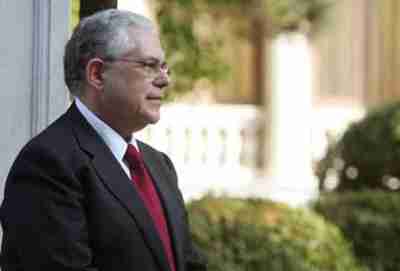 |
EU officials breathed a sigh of relief when Lucas Papademos, a former vice president of the European Central Bank, was named the country’s new prime minister of Greece on Thursday, after several days of bitterly hostile negotiations among the political parties. Papademos is considered to be a "technocrat" rather than a "politician," which we can hope means that he does actual work rather than simply mouthing phrases. He certainly has his work cut out for him: He has to convince the Parliament to pass the collection of austerity measures that the EU is demanding before providing the next €8 billion bailout payment, which is needed pretty much right now. Kathimerini
Italy's Senate is expected to vote on Friday for austerity measures demanded by the European Union to avert a euro zone meltdown. Prime Minister Silvio Berlusconi will step down within a couple of days, making way for a new emergency government. The interim prime minister is expected to be Mario Monti, a former European Commissioner who, like Papademos, is considered to be a technocrat, rather than a politician. Whether Monti and Papademos, neither of whom were elected by the people, can gain popular support for their harst austerity programs remains to be seen, but at least the politicians in Brussels are happy with the choices. Reuters
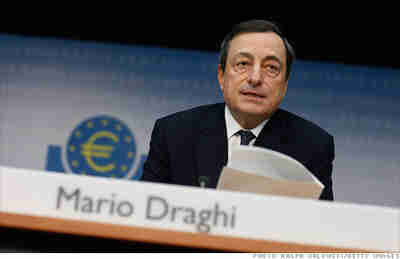 |
Mario Draghi is the new president of the European Central Bank (ECB), replacing Jean-Claude Trichet, who recently retired. The fact that an Italian is replacing a Frenchman is problem enough, but a lot of people are pressuring Draghi to bail out Italy by having the ECB "print money" and use it to make massive purchases of Italian bonds -- a move being called the "Big Bazooka." Trichet would never have stood for this nonsense, but Draghi is the new kid, and he's being pressured hard. The Germans oppose this plan, and it would require renegotiating eurozone treaties, but it's increasingly seen as the only way to kick the can further down the road from where we are now. CNN
German Chancellor Angela Merkel was quick to say on Thursday that her main goal was to preserve the eurozone and Greece's place in the eurozone. That's a big change from a couple of weeks ago, when she and French prime minister Nicolas Sarkozy lectured former Greek Prime Minister George Papandreou, saying that if he wanted Greece to remain in the eurozone, he'd better do as he's told. But now there's a new wrinkle. Sarkozy is publicly advocating a 'two-speed' Europe. He said that with 27 EU member states, growing to 32, 33 or 34 when the Balkan states join, deeper economic integration is impossible:
"In the end, clearly, there will be two European gears: one gear towards more integration in the euro zone and a gear that is more confederal in the European Union."
The division between euro and non-euro countries in the EU has been causing increased friction and hostility, because the eurozone countries are making decisions that affect everyone, and the non-eurozone countries don't have a say in the decisions. Talk of a split Europe is becoming increasingly serious, leading European Commission President Jose Manuel Barroso to object:
"Let me be clear - a split union will not work. This is true for a union with different parts engaged in contradictory objectives; a union with an integrated core but a disengaged periphery; a union dominated by an unhealthy balance of power or indeed any kind of directorium. [The EU is based on justice, equality and rule of law,] not on any power or forces.
If you've been following this debate, Dear Reader, then you must realize that we're in a time of major historic changes, with the changes occurring more and more rapidly each day. The feeling that events really are spinning out of control is growing. EU Observer
There have been at least nine incidents since March between the Philippines and China over their conflicting claims to the Spratly Islands and the South China Sea. In the latest incident, on October 19, a Philippine warship became entangled with the cables of a Chinese fishing vessel, which at the time was towing 23 unmanned dinghies. The Chinese boat immediately left the scene, abandoning the dinghies. A Chinese newspaper has warned the Philippines against provoking China into taking retaliatory military action. "A counter-attack is likely," the newspaper said in a strongly worded editorial, adding that the Philippines "should prepare for the sound of cannons" from China. A columnist in the same paper urged Beijing to wage "tiny-scale battles" against both the Philippines and Vietnam "to teach them a lesson." Asia Times
Prince William, the Duke of Cambridge, will be deployed to the Falkland Islands for six weeks next February and March, in a routine assignment as a Royal Air Force search and rescue co-pilot. As 2012 will be the 30th anniversary of Britain's defeat of Argentina in the Falklands War. The RAF is making clear that William will not conduct any ceremonial duties while he is there, to prevent tensions from worsening. His new wife Catherine will not accompany him. William has increased his workload recently as he seeks promotion, and hopes that this deployment will allow him to take full charge of his helicopter. BBC
(Comments: For reader comments, questions and discussion,
see the 11-Nov-11 News -- World focuses on Mario Draghi and the European Central Bank for the 'Big Bazooka'
thread of the Generational Dynamics forum. Comments may be
posted anonymously.)
(11-Nov-2011)
Permanent Link
Receive daily World View columns by e-mail
Donate to Generational Dynamics via PayPal
Protests in Russia unify ethnic Russians against the North Caucasus
This morning's key headlines from GenerationalDynamics.com.
* Greece's Papandreou says his successor will be .........
* Italy unravels in bond panic
* Pandemonium in Europe shocks world markets
* Chaotic European politics raises fears of a collapse of the euro zone
* Xenophobia towards Fulanis in Ghana becomes extreme
* The 'Occupy Wall Street' protests began in Tahrir Square
* Protests in Russia unify ethnic Russians against the North Caucasus
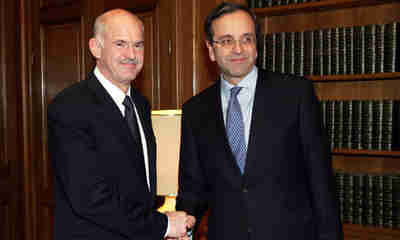 |
As if the European scene needed any more farce, Greece's Prime Minister George Papandreou began what appeared to be a resignation speech to the nation on Wednesday. He signaled the "beginning of a new political mentality, a new political culture":
"Today we leave aside our differences [with] a common effort to ensure the country moves forward, not only to remain part of the eurozone but also to emerge from the crisis. [The interim government would] justify the sacrifices made by the Greek people over the past two years. ...I never put my position above the national good. For me, Greece is above everything. Wherever I go, I will carry the Greek flag in my heart."
He also said that he would do everything he could to support the new prime minister and the new government. But he didn't resign, and he didn't indicate who his successor will be, because of bitter disagreements with the opposition. Greece still hasn't received the next €8 billion bailout payment, which was to have been provided right about now, in time to make the next debt payment. But European officials have conditioned it on formation of a new government that passes the committed austerity measures, and every day's delay in forming a new government also delays the bailout payment. Kathimerini
What appears to be a full-fledged bond panic began on Wednesday, as yields (interest rates) on Italy's bonds went parabolic, going well above 7% to 7.25%. Italy has €1.9 trillion in debt, with something like €77 billion scheduled to roll over this year, and €200 billion next year. Having to pay 7.25% interest on this new debt would move Italy into a vicious downward spiral. Even worse, the interest rate appears poised to continue increasing, perhaps to 10% and beyond. That's what happened to Greece, Ireland and Portugal. Here's a comparison of what happened to Greece last year with what's happening to Italy right now:
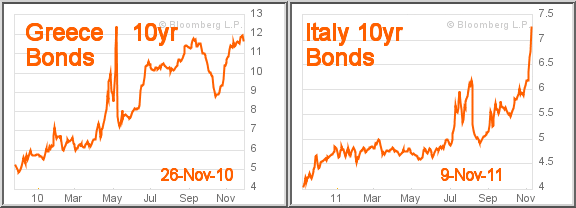 |
When Greece's bond yields began to exceed 7% last year, I wrote that a major panic was in progress. As you can see, Greece's bond yields then ran up above 12%, before they were brought down temporarily by the shock and awe bailout package announced on May 9, after which they continued to rise. Wednesday's surge to 7.25% may indicate that a major new panic is in progress. Bloomberg
Wall Street stocks fell 3-4% on Wednesday, as investors realized that Italy is too big to fail but also too big to bail, and yet was failing anyway. There's really only one proposal on the table that following the "Kick the Can Principle," and that's to have the European Central Bank (ECB) "print money" and use it to purchase massive amounts of Italian bonds, enough to bring the yields down. There are just a few problems with this idea -- the Germans are against it, the ECB is against it, and it violates existing eurozone treaties. Even so, it's on the table. Guardian
French and Germany officials have been holding discussions for a split of the eurozone, even though some people believe that this move would bring forward the nationalistic hatreds that led to World War II. Italy's Prime Minister Silvio Berlusconi said he would step down, but he insisted on new elections, leaving both Italy and Greece facing long periods of political instability, at a time when the entire European economy is deteriorating into chaos. Even with Berlusconi gone, there's no credible belief that his replacement, whoever that may be, will be able to solve Italy's problems any better than he did. Reuters
 |
Although they're ethnically similar, and share a common religion (Islam), tension is mounting between the residents of Ghana and the nomadic Fulanis in the city of Agogo. The Fulani culture is one of herding cattle and trading, and this requires cattle herds to travel over residents' land. This was even an issue in America in the 1800s, when the cowboys complained that the farmers were building too many fences, and the farmers were complaining that the cowboys's herds were destroying their crops. This was a theme of the Broadway show Oklahoma!. In Agogo, the Fulanis and their herds are being forced off of the lands in one region, but they have no place to go because no one wants them on their land. This has resulted in extreme xenophobic accusations of murder, rape and inhuman treatment. Joy Online (Agopo) and Citi FM Online
One effect that has inspired little comment has been the spread of the "Arab spring" protests to the West. Western media largely report the Occupy wall Street protest as the inspiration for other protest across the world. But this new form of protest took the ancient route out of the Arab world, through Spain. Inspiring the young Spanish Indignados to occupy squares in cities across their country, before moving across the Atlantic to America. There is little, if anything, new in the "Occupy" protests that was not already present in Tahrir Square in Cairo. Asia Times
National Unity Day in Russia, on November 4, brought formerly opposed protest groups together on a single issue: to demand an end to the government’s financing of the North Caucasus. Tens of thousands of protesters from different groups -- the nationalist Just Russia party, democratic activists, the Communist party, and others -- protested in cities across Russia, with slogans such as "Russia for Russians" and "Stop Feeding the Caucasus." The level of xenophobia between ethnic (Orthodox Christian) Russians and (Muslim) Caucasians has been surging. The Russian government has been pouring money into the North Caucasus in an attempt to quell the unrest, as the 2014 Olympics games in Sochi in the North Caucasus approach. Jamestown
(Comments: For reader comments, questions and discussion,
see the 10-Nov-11 World View -- Pandemonium in Europe shocks world markets
thread of the Generational Dynamics forum. Comments may be
posted anonymously.)
(10-Nov-2011)
Permanent Link
Receive daily World View columns by e-mail
Donate to Generational Dynamics via PayPal
Obama and Sarkozy say that they can't stand Israel's Netanyahu
This morning's key headlines from GenerationalDynamics.com.
* Italy's Berlusconi loses parliamentary majority, appears close to resigning
* IAEA says Iran's nuclear program shows 'military dimensions'
* Israel wants the west to impose 'deadly sanctions' on Iran
* Are we about to repeat the 2003 invasion of Iraq?
* Obama and Sarkozy say that they can't stand Israel's Netanyahu
* Security Council report finds no consensus on Palestinian statehood
* Star Trek 'Nazi' episode airs for first time in Germany
 |
As Italy's financial situation becomes increasingly precarious, Italian Prime Minister Silvio Berlusconi failed to muster an absolute majority in a routine parliamentary ballot, fueling further calls for him to resign as Italy struggles to convince investors it can fund itself. "The government doesn’t have a majority," Pier Luigi Bersani, leader of the main opposition Democratic Party, said as he called on the premier to resign after the vote. "We all know that Italy runs the real risk of not being able to access the financial markets in the next few days." Berlusconi has been facing more defections, and President Giorgio Napolitano may call a new confidence vote tomorrow. Adnkronos International (Italy)
The United Nations International Atomic Energy Authority (IAEA) reported on Tuesday that it has credible evidence that Iran is moving towards development of nuclear weapons, though most of the evidence dates back to 2003. According to the report, Iran has been developing nuclear-grade material, has procured equipment and materials that "would be useful" in the development of a nuclear weapon, has reported developing detonators without explaining their intended use, and has done computer modeling on payloads for missiles and ballistic trajectory. Much of the evidence refers to activities prior to 2003. There's apparently no evidence that Iran is on a crash program to develop a nuclear weapon, although work continued at least until 2009. Guardian
Israel's defense minister Defense Minister Ehud Barak hopes that the west will impose "deadly sanctions" on Iran, targeting its financial institutions as well as physical sanctions, but said that he is not optimistic that the international community has the will to come together in order to put a stop to Iran's nuclear program. Israel is expecting the United States to take the lead in pushing the United Nations and other Western countries to impose tougher, new sanctions on Iran following the publication of the incriminating IAEA report. No decision has been made regarding a military operation, but, "There's no chance in such a situation for 500,000 killed, not 5,000 or even 500 killed." Jerusalem Post
Comparisons are being made to the situation in 2003, when the United States launched a ground war into Iraq, based on intelligence about weapons of mass destruction that later turned out to be wrong. The IAEA report presents evidence that is being widely questioned, with fears expressed that military action will be taken against Iran, by either Israel or the United States, based on potentially faulty intelligence.
From the point of view of Generational Dynamics, the situation is very different today than in 2003. The 2003 invasion was triggered by widespread panic, in the U.S. and other countries, over weapons of mass destruction. (See "The Iraq war may be related to the bombing of Hiroshima and Nagasaki." from 2008.)
But the generational attitudes are very different today. In particular, there is no widespread panic today over possible nuclear weapons in Iran. In fact, the opposite is true: The U.S. and other countries are war-weary, and most attitudes are opposed to launching another war.
Having said that, I'm not able to judge whether there's widespread panic in Israel, comparable to the panic in the U.S. in 2003. However, I strongly suspect not, especially since Israel has already had a recent humiliating experience with widespread panic -- when Israel launched the 2006 war against Hizbollah in Lebanon, with no plan, no objectives, no idea what they were doing, just four hours after two Israeli soldiers had been abducted.
I get the same feeling that I got last week when Greece's prime minister announced a referendum over the euro deal -- a referendum wasn't in the script, and now military action against Iran isn't in the script. Just as it seems like the world screamed in fury against Greece's Prime Minister George Papandreou when he announced the referendum plans, there are similar screams of fury over possible military action in Iran.
Furthermore, as I've described before, Iran takes pride in not having invaded other countries, even though other countries have invaded Iran. Furthermore, the younger generations of Iran are generally pro-Western and do not particularly hate Israel, as do the survivors of the 1979 Great Islamic Revolution. And so a preemptive nuclear attack on Israel would be as horrifying to the Iranian people as it would be to the rest of the world.
Finally, I would remind long-time readers what I've been saying for years: That I expect Iran to be our ally, along with India, Russia and the West, in the Clash of Civilizations world war, opposing China, Pakistan and the Sunni Muslim countries.
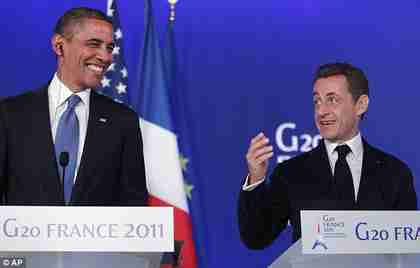 |
Without realizing that they could be overheard, last week at the G-20 meeting, France's president Nicolas Sarkozy said, "Netanyanu - I can't stand him. He's a liar." President Barack Obama replied, "You're sick of him? I have to deal with him every day." They were speaking of Israel's prime minister Benjamin Netayahu. Both Sarkozy and Obama have been critical of Israel in the past for building settlements in the West Bank. Daily Mail
There is no consensus among the 15 Security Council nations on the Palestinian application for full United Nations membership for a Palestinian state, according to a draft report. For the resolution to be adopted by the council, it needs at least nine "yes" votes and must avoid a veto by any of the permanent members. However, the United States has already announced it will veto the resolution, and only eight of the remaining votes are likely to be "yes." China, Russia, Brazil, India, South Africa and Lebanon have indicated their support for the resolution. France, Britain and Colombia plan to abstain. Nigeria and Gabon will likely vote "yes" and Germany and Portugal will abstain or vote "no." Bosnia said it was unable to make a statement because its three-member presidency is split on the issue which means it will most likely abstain, diplomats said. Palestinian Foreign Minister Riad Malki blamed the United States for the result. "We expected to get nine votes in the Security Council, but its clear now, with the U.S. counter effort and huge intervention, that we are not going to have these nine votes." Associated Press
 |
Trekkies in Germany have eagerly savored watching over and over the voyages of the Starship Enterprise in Star Trek episodes from the 1960s, but unlike the rest of the world, they have been unable to see one particular Star Trek episode in their native land, until now. The episode "Patterns of Force," was shown in the U.S. in 1968. Captain Kirk, played by William Shatner, and Spock, played by Leonard Nimoy, find themselves on a planet whose culture is now modeled on the German Nazi Party of old Earth in the 1930's. At one point Kirk and Spock are captured but make their escape by wearing stolen Nazi uniforms, with Spock wearing a helmet to hide his pointed ears. The episode was considered too provocative for 1970s Germany, especially as at one point it describes Nazi Germany as "the most efficient society ever created." It was aired on German television for the first time on Friday night, though subject to the restriction that no one under 16 could be allowed to see it. Telegraph
(Comments: For reader comments, questions and discussion,
see the 9-Nov-11 World View -- Iran nuclear report raises questions of sanctions and military action
thread of the Generational Dynamics forum. Comments may be
posted anonymously.)
(9-Nov-2011)
Permanent Link
Receive daily World View columns by e-mail
Donate to Generational Dynamics via PayPal
Assad regime's fantasy virtual world of denial
This morning's key headlines from GenerationalDynamics.com.
* Euro crisis approaches the endgame for Germany
* Is Nigeria's Boko Haram into terror for the cash?
* Slaughter against innocent civilians continues in Syria
* Assad regime's fantasy virtual world of denial
* Italy's Berlusconi uses Facebook posting to deny resignation
* Silvio Berlusconi postpones release of his latest love songs
 |
"Run for your lives" is the new motto of Europe, as flight of capital to safe havens is in full swing, especially in Italy, Spain and Greece. Money is pouring into Switzerland (not a eurozone country), and wealthy Greeks are buying expensive second homes in Berlin and Europe. Germany agreed to join the euro currency based on certain promises and commitments -- that only stable countries (not like Greece or Italy) would be allowed in, and that German taxpayers would never be held liable for the debts other other countries (as has already happened with Greece). And now another breach of confidence is on the horizon, with the Germans being expected to accept the notion that the European Central Bank (ECB) will be allowed to make almost unlimited "special drawing rights" available to ailing euro countries, forcing the German taxpayer, once again, to be liable. The question the German government now faces is whether to pay for a stable currency, or dissolve the monetary union. The decision can no longer be put off for long. Spiegel
Concerns have been expressed that Boko Haram, the Nigerian terrorist group that killed up to 150 people in a huge terrorist attack on Saturday, is linking up with Al-Qaeda in the Islamic Maghreb (AQIM) in order to perpetrate terrorism more widely in their quest to make northern Nigeria an Islamic state. But many people believe that Boko Haram (which means "Western education is a sin") is not all that interested in ideology, and instead is using terror to draw media and political attention to economic problems in the north, and to seek a government payout similar to the kind given two years ago to rebels in Nigeria’s oil rich south. CS Monitor
Less than a week after the regime of Syria's president Bashar al-Assad promised the Arab League to end the violence against innocent civilians, regime troops on Monday moved into a residential district of Homs after six days of tank bombardment that killed scores of people and wounded hundreds. The government says it is fighting armed gangs, but foreign journalists are not permitted to verify those claims, and according to an activist, "They are now storming houses and arresting people.... The shabbiha (pro-Assad militia) have brought pick-up trucks and are looting buildings. Arab countries so far have not demanded that al-Assad step down. They fear a potentially contagious chaos could ensue, given Syria's volatile sectarian divisions, which are replicated in varying degrees in other Arab countries of the region. Reuters
According Syrian TV (former) presenter Ibrahim al-Jabin, interviewed on the BBC (my transcription):
"To be honest, this needs a special kind of analysis, because the Syrian regime is genuinely stuck in a mentality of denial. They are truly unable to believe that there is actually a protest movement against them. Everything that's going on around them is actually a conspiracy. Therefore, they try to paint a new reality, a virtual reality, in which they live....When I say the Syrian media are dishonest, I mean they are dishonest even in weather forecasting. They believe that if they say, 'It's too hot today', it will negatively affect tourism. They believe if they speak about the drought in Syria, it will be an indirect reference to government policy.
They actually go so far as to invent these armed terrorist gangs. They get people to act the role, and they go and film them, and any professional can tell that they are quite professional in filming and in directing and in using zoom-in and zoom-out, but it's low quality."
 |
Bond yields (interest rates) on Italy's ten-year bonds took another sharp upward spike on Monday, to the devilish level of 6.66%. Italy has €1.9 trillion in debt, and large chunks of it have to be rolled over in the next few months. Bond yields are rising rapidly, are already unsustainable, and may soon exceed 7%. In this environment, Italy's prime minister Silvio Berlusconi is being pressured to resign. On Monday, Berlusconi used a posting on Facebook to deny that he's planning to resign, but his support is deteriorating, and many believe he'll step down soon. That won't be the end of his troubles, as he's facing some legal actions that were postponed as long as he's in office. Mirror
Italy's prime minister Silvio Berlusconi has been forced to delay the release of his latest love song album, entitled "True Love," with words by Berlusconi and music by his long time guitarist partner Mariano Apicella. The album had been due for release in September, with a huge launch party planned in Milan. Berlusconi is a former cruise ship crooner, and this would be his fourth album of love songs. But as he struggles to tackle Italy's massive public debt, hold together his crumbling coalition and defend himself in three trials, Berlusconi has been forced to push the release date back, Guardian
(Comments: For reader comments, questions and discussion,
see the 8-Nov-11 World View -- With Italy crumbling, euro crisis approaches an end game
thread of the Generational Dynamics forum. Comments may be
posted anonymously.)
(8-Nov-2011)
Permanent Link
Receive daily World View columns by e-mail
Donate to Generational Dynamics via PayPal
China's 'good neighbor' policy failing, as neighbors turn against China
This morning's key headlines from GenerationalDynamics.com.
* Muslim hajj pilgrims perform devil stoning ritual
* Italy and Greece governments close to collapse over euro crisis
* Congressional 'Super Committee' faces same problems as Greece and Italy
* Applying the 'Kick the Can Principle' to the supercommittee
* China's 'good neighbor' policy failing, as neighbors turn against China
 |
Chanting "God is great," some 2.5 million Muslims on Sunday stoned pillars representing the devil in a symbolic rejection of temptation on the second day of their annual hajj pilgrimage. Vast crowds cast pebbles as they flowed past the three pillars. The ritual will be repeated for two more days, with participants eventually throwing stones at all three pillars. It is one of the most dangerous stages of the hajj, with the press of people around the pillars creating the risk of a stampede. Hundreds were killed in 2004 and 2005, before Saudi authorities built the current complex to reduce the stampede danger. AP
Greek Prime Minister George Papandreou will probably step down in the next day or two, as a result of an agreement to form a unity coalition government to pass the austerity measures required by European officials to get the next €8 billion bailout payment. Italy's Prime Minister Silvio Berlusconi has been humiliated by a European demand that the IMF monitor Italy's finances, indicating the Berlusconi is untrusted. Berlusconi is facing massive opposition to proposed austerity measures, and his waning political support may force him to step down. The Australian
Greece, Portugal, Ireland, Spain and Italy have been facing enormous political problems in trying to cut public debt, whether by raising taxes, by laying off government workers, or by cutting government benefits. Indeed, as the huge credit bubble of the mid-2000s continues to collapse, leaving less money in the world every day, almost every country in the world is facing severe debt problems. America is no different, and the Congressional "super-committee" is the solution that's supposed to save us. The supercommittee is reported to be deadlocked, but a letter to the supercommittee from a group of 100 Republic and Democratic party representatives calls for all options to be laid on the table. The Democrats want to raise taxes substantially, while the Republicans want to cut benefits substantially. They need to reach agreement within a week to give Congress time to pass the agreement by the November 23 deadline, or face a "sequestration option" with huge automatic cuts to entitlements and defense. Fox News
Recently, I proposed a theory that there are certain generational script elements that the world is following, and that can't be violated. ( "4-Nov-11 World View -- Greece buckles to European demands and cancels referendum") The script that's being followed is very similar to the 1930s.
What I'm now calling the "Kick the Can Principle" is this: In this generational Crisis era, if you want to forecast what's going to happen in the future, then forecast the solution that kicks the can down the road. That is, no major decision can ever be made, except to make a decision to postpone making a decision.
We've seen the Kick the Can Principle hold true time after time for at least two years in Europe. Whenever a decision must be made, the solution is always to just increase public debt, which postpones the problem to an unforeseeable future date when the debt must be repaid.
The reason that the Kick the Can Principle works is that it's applied to problems which have no solution. If the European fiscal crisis had a solution, they would have found it by now. But none exists.
Similarly, there is no solution the U.S. debt problem. And I don't mean that there's no solution unless the President does A or the Republicans do B or the Democrats do C. I mean: There's no solution at all. For all objects X, if X is a solution, then X does not exist. Or, if X exists, then X is not a solution. No solution exists.
In particular, the following are not possible solutions:
Now, you may say that any of these are POSSIBLE. And I say, No, not one is possible, because not one could pass Congress. That is, they're POLITICALLY impossible, in this generational era. That's one of the things that make this era unique - at least since the 1930s.
So, what's going to happen with the supercommittee, if we apply the Kick the Can Principle?
Well, they probably won't reach an agreement, but even if they do, then Congress will not pass it by November 23. Thus, the sequestration option will come into effect, but it will be postponed.
There's a debate going on over whether unemployment benefits should be further increased. This would, of course, increase the public debt even further, but the Kick the Can Principle says that there's a good chance that it will be passed.
As for Greece and Italy, the Kick the Can Principle says that both countries will be bailed out for as long as possible, and it will end only when there's a full scale global financial panic and collapse.
Burma's recent decision to halt the Myitsone dam joint project with China, and a recent murder of 13 Chinese sailors on the Mekong river, as well as territorial disputes in the South China Sea with Vietnam and the Philippines, point to how China's relations with its regional allies have been deteriorating. This comes at a time when China humiliated itself over its policy in Libya. Many Chinese were disquieted by their government's decision to evacuate China's citizens from Libya, and would have preferred a bolder effort to protect the countries' commercial assets there. Similarly, the Chinese government's later, and quite sudden, about-face in recognising the rebel Transitional National Council as Libya's government aroused considerable sneering at home. After all, China spent valuable political capital to oppose Nato's airstrikes at the beginning of the intervention, only to end up backing the forces that Nato helped bring to power. Centre for International and Strategic Studies, Peking University
(Comments: For reader comments, questions and discussion,
see the 7-Nov-11 World View -- Congressional 'Super Committee' faces same problems as Greece and Italy
thread of the Generational Dynamics forum. Comments may be
posted anonymously.)
(7-Nov-2011)
Permanent Link
Receive daily World View columns by e-mail
Donate to Generational Dynamics via PayPal
U.N. report will detail Iran's nuclear weapons development
This morning's key headlines from GenerationalDynamics.com.
* Boko Haram sect kills 150 people in huge terrorist attack in Nigeria
* Arab Leagues warns Syria to end violence against peaceful protesters
* U.N. report will detail Iran's nuclear weapons development
* Germany threatens to halt submarine sale to Israel
 |
The body count is surpassing 150 in a 'heinous' wave of gun and bomb attacks in the northern Nigeria town of Damaturu. The perpetrators are an Islamic militant sect called Boko Haram, which means "western education is a sin" in the group's Hausa language, claimed credit for the attack. It's believed that Boko Haram has ties to al-Qaeda in the Islamic Maghreb (AQIM). A sect member said, "We will continue attacking federal government formations until security forces stop persecuting our members and vulnerable civilians." As we've reported in the past, ( "24-Feb-11 News -- Clashes in Jos, Nigeria, pit Christians against Muslims,") Nigeria is split between Muslims in the north and Christians in the south, and the two groups have committed numerous atrocities against each other. The Friday bomb and gun attacks, targeted police stations, an army base and churches in the cities of Damaturu, Maiduguri and two other small towns. The sect claims to want to see the establishment of an Islamic state in northern Nigeria. AFP
The regime of Syria's president Bashar al-Assad announced on Saturday that they are releasing more than 500 prisoners who have been arrested during the protests of the last eight months. At the same time, government security forces continued violence against protesters near Homs, killing more than a dozen people. As we've reported, Assad's regime signed an agreement with the Arab League to end violence, but it's no surprise that Assad never intended to follow through. According to one analyst, the prisoner release is a smokescreen. "The Syrian regime may release 500 people from prison, but since they signed the agreement with the Arab League in Cairo, they arrested more than 2000 people. So, releasing prisoners means nothing. They can apprehend far more people than those whom they release in no time. This is another ploy by the Syrian regime." The Arab League is warning Syria that failure to abide by the peace plan would be a catastrophe for Syria and the region, but the Arab League never does anything but issue statements. VOA
A report to be released next week by the United Nations International Atomic Energy Agency (IAEA) will make the most detailed charges to date that Iran's nuclear program is geared toward weapons development and military use. The report will include new data, including Iranian technologies to build a computer model of a nuclear warhead. [I'm not sure why creating a computer model means much. - JX] The report will come at a time when rumors are swirling that Israel, the U.S. and the U.K. are discussing the possibility of a military strike on Iran. CNN
The German government is threatening to halt the delivery of a submarine capable of firing nuclear warheads in protest of the Israeli government's recent decision to build 1,100 new settlements in the West Bank. Germany's subsidized submarine sales program is linked to World War II reparations. The nuclear-weapons capable Dolphin submarines are an important part of the Israeli military strategy. The navy already owns three of the submarines and two further vessels are currently being built. The sixth submarine is now in jeopardy. Spiegel
(Comments: For reader comments, questions and discussion,
see the 6-Nov-11 World View -- Boko Haram sect kills 150 people in huge terrorist attack in Nigeria
thread of the Generational Dynamics forum. Comments may be
posted anonymously.)
(6-Nov-2011)
Permanent Link
Receive daily World View columns by e-mail
Donate to Generational Dynamics via PayPal
G-20 world financial summit ends in failure
This morning's key headlines from GenerationalDynamics.com.
* G-20 world financial summit ends in failure
* Italy is placed under IMF monitoring
* China: Time the West stopped being obstinate
* Britain's David Cameron issues a stark warning
* Papandreou barely survives confidence vote in Greece's parliament
* Threats grow against Iran's nuclear program
* The 'Freedom Waves to Gaza' flotilla is seized by Israel
* Britain will abstain on U.N. Security Council Palestine statehood vote
G-20 world financial summit ends in failure
A meeting in Cannes, France, of the leaders of the "Group of 20" (G-20) industrial and developing economies ended without producing any of its objectives. Instead, they kicked the can down the road on all issues. They came to no agreement on how to handle the euro financial crisis and they obtained no foreign commitments for investments in the European Financial Stability Facility (EFSF), which is supposed to prevent future crises. Wall Street Journal (Access)
|
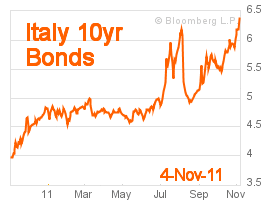 |
Italy's Prime Minister Silvio Berlusconi tried to play down its significance by saying that he was just agreeing to be nice, and anyway, Italy didn't need any IMF money, but the decision that the International Monetary Fund (IMF) will monitor Italy's commitments to growth and austerity reforms is a humiliation for Berlusconi, who is essentially being told that he isn't trusted. Italy continues to follow the path of Greece in deteriorating bond yields (interest rates), which have now risen to an unsustainable euro-era historic high of 6.370% for 10 year bonds. The Economist
The European leaders at the G-20 summit had hoped to convince China to invest in the EFSF bailout fund, but China declared to do so. "The emerging powers to put their hard-won reserves at risk for the sake of far richer European societies, they need to have a greater say in global governance."
"You'd have thought that the United States debt-ceiling debacle and the eurozone's endless cycle of half-measures declared and quarter-measures taken would have impressed upon Western leaders the urgency of finding new solutions to their economic difficulties and the modesty of recognizing the need for help in implementing them. You'd be wrong. Instead, they responded to a recent proposal from some emerging countries to increase the firepower of the IMF with a mixture of fear and arrogance."
As we've reported, Britain's Prime Minister David Cameron is unhappy with the euro leaders because he was excluded from their recent summit meeting. He did attend the G-20 meeting, issued a stark warning. "I am not going to pretend all the problems in the eurozone have been fixed. They have not. The task for the eurozone is the same as going into this summit. The world can't wait for the eurozone to go through endless questions and changes about this. We, like the rest of the world, need the eurozone to sort out its problems. We need more to happen in terms of detail on the European firewall." He added that this is only "a stage of the global crisis." Guardian
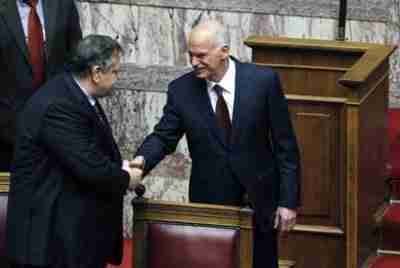 |
Greece's Prime Minister George Papandreou won a confidence vote in Parliament early on Saturday by a vote of 153 out of 300 MPs. Papandreou is being asked to step aside by many in his own party and the opposition. In that case, it's thought that Finance Minister Evangelos Venizelos is most likely to succeed him, until elections could be called. Papandreou has indicated that he would like lead a coalition government until early elections could be called. Kathimerini
Israel's President Shimon Peres on Friday said that the media speculation about a potential Israeli attack on Iran may have some basis in truth, since he believes probably won't be possible to find a diplomatic solution. French President Nicolas Sarkozy condemned Iran's nuclear program and said France would not stand idly by "if Israel's existence were threatened. ... Iran's behavior and this obsessional desire to acquire nuclear military (capability) is in violation of all international rules, and France condemns firmly the lack of respect for these rules." Jerusalem Post
The two boats in the "Freedom Waves to Gaza" flotilla that approached Gaza on Friday with the purpose of breaking Israel's blockade of Gaza were seized by the Israeli Defenses Forces (IDF) navy, after they were boarded and led to the Israeli port Ashdod. No one was hurt, according to the IDF, and the activists on board were turned over to police and immigration authorities. Jerusalem Post
Britain says that it will join France in formally abstaining in the United Nations Security Council on any vote to admit a Palestinian state as a U.N. member. Admitting a new state to U.N. membership requires a Security Council vote, and Palestinian president Mahmoud Abbas has already formally request such a vote. However, the United States has already announced that it will veto the proposal, so Britain's and France's abstentions are symbolic. However, they are a humiliation for Abbas because Hamas has opposed the bid, and because Hamas has gained additional respect versus Abbas among Palestinians for negotiating the deal that freed over 1,000 Palestinians from Israeli jails in return for a captured Israeli soldier, Gilad Shalit. Telegraph
(Comments: For reader comments, questions and discussion,
see the 5-Nov-11 World View -- Threats grow against Iran's nuclear program
thread of the Generational Dynamics forum. Comments may be
posted anonymously.)
(5-Nov-2011)
Permanent Link
Receive daily World View columns by e-mail
Donate to Generational Dynamics via PayPal
Fed Chairman Ben Bernanke's press conference
This morning's key headlines from GenerationalDynamics.com.
* Greece buckles to European demands and cancels referendum
* Referendum call forces historic changes
* Fed Chairman Ben Bernanke's press conference
* Following the script
* Elements of the script
* A little generational theory
 |
During a tense and tumultuous day in Athens, Greece's Prime Minister George Papandreou backtracked on a proposal to put Greece's latest debt deal with the European Union to a referendum. Furthermore, he suggested that he would be willing to step aside to form a unity government but said he still wanted his MPs to back him in a confidence vote on Friday night. "I am not clinging onto my seat," he said. The December 4 referendum has been cancelled, but if Papandreou loses the no-confidence vote on Friday, then there will be a December 4 election. Kathimerini
Whether or not the government of Greece's Prime Minister George Papandreou collapses, as may well happen on Friday, Papandreou's referendum call has caused dramatic changes. Within Greece, the main opposition candidate Antonis Samaras from the conservative New Democracy party was finally forced to acknowledge that he would support, however reluctantly, the austerity measures that the euro leaders were forcing on Greece. As for Greece itself, France's president Nicolas Sarkozy and Germany's Chancellor Angela Merkel made it clear that if you want to stay in the eurozone -- or even in the European Union -- then you have to do as your told. These are two major changes that have been brought about by Papandreou's call for a referendum. Some analysts are saying that these are exactly the results that Papandreou was hoping for, since he was almost completely isolated in supporting the austerity measures that would be required to continue getting bailout payments. CS Monitor
As an aside, Nicolas Sarkozy has been quoted as saying, "We can't stop the Greeks from committing suicide, but it's better to let them kill themselves, than to let Angela Merkel do it."
During Fed Chairman Ben Bernanke's press conference on Wednesday, he was asked the following question: "Given how hard it's been to bring down unemployment in the past, why are you confident you have the tools to bring it down in the future?"
Here's his response (my transcription):
"Well, we have the ability to provide more stimulus and accomodation. We believe that a good bit of the unemployment that we are seeing is what economists would call cyclical unemployment, that is unemployment rising because of inadequate demand in the economy. If that's the case, then monetary policy by lowering interest rates, making financial conditions more accomodative should stimulate demand, should stimulate spending, over a period of time, that will help bring down cyclical unemployment. That is something we know from a lot of experience, and although it's been a very slow process here, there's no reason to think that the same basic effect will not work in this case as well.Now, it's also possible that part of the increase in unemployment reflects so-calld structural factors, mismatches between workers skills and job opportunities, loss of skills, geographical mistmach, etc. And to the extent that that's the case, then monetary policy is much less effective, because in that case only other kinds of labor market policies can make progress against that type of unemployment. Then again, I do think that a considerable part of the unemployment we're seeing is cyclical, and is thus amenable to monetary policy.
Final comment. Cyclical umplopyment left untreated, so to speak, for a long time can become structural unemployment as people lose skills, they lose attachment to the labor force, as their work networks dry up and so on. So in that respect, it's important for us to try to address the unemployment problem, in a sense, while it's still amenable to monetary policy."
With regard to the first paragraph above, I cannot for the life of me see how Bernanke can possibly believe what he's saying. He says we know certain things from "a lot of experience," when the whole point of the question he was asked were that those things have been abject failures in the last three years.
In a report last month, I quoted former Fed chairman Alan Greenspan as saying, "All the econometric models failed in 2008 - across the board." Surely Bernanke knows that as well, and yet he and other analysts and economists keep saying that what has failed before will work next time. The fact is that when Bernanke talks about "a lot of experience," he's talking about the period from 1945 to 1990. Nothing in that period is relevant today, and that's why all the econometric models fail, time after time. You have to go back to the 1930s to find data that's relevant today.
I've been writing on Generational Dynamics for close to ten years now, and I've always tried to push the envelope to see what could be predicted, based on generational forecasting, and what could not. I've frequently pointed out that each individual has free will and can do anything he wants, but when you're talking about a generation that has millions of people, then certain kinds of aggregate actions and behaviors can be predicted with mathematical certainly. I've used the analogy that if you throw a rock into a lake, then you can't predict what any individual water molecule will do, but you can predict with certainty what kind of waves and ripples you'll get.
The last few days have solidified for me a feeling that's been growing -- that the world has been following a preordained generational script, that cannot be prevented or avoided. And a Greek referendum was not in the script. The script that's being followed is very similar to the one the world was following in the 1930s.
When I wrote my article on the 1932 book, "The bubble that broke the world," I suggested that just as America tried to bail out Germany in 1931, China might try to bail out America in the current crisis. We can now understand why America tried to bail out Germany in 1931. America was forced by international pressure to do so, just as Europe is being forced by international pressure to bail out Greece, and Greece is forced to accept the terms.
When I was in school in the 1950s, there were two major mysteries about the 1930s that everyone referred to. First, why did all the economists keep saying that the worst was over, even though the Great Depression continued to worsen? And second, why did England believe in "peace in our time," when it was clear to Churchill and a few others that Germany was rapidly arming itself for war, while everyone else seemed oblivious to it.
Today I won't attempt to go into the question of why everyone seems oblivious to China's massive preparations for war with the U.S., except to point out that the situation with Germany is the obvious analogy.
But the first question, on why 1930s economists kept saying that the worst is over, is completely analogous to Bernanke's inane statement quoted above.
I've repeatedly pointed out on my web site that economists can't explain the tech bubble that began in 1995 -- why it occurred at all, and why it didn't occur instead in 1985 or 2005. Even if you don't accept all of generational theory, the answer to this question is unambiguously obvious -- the 1990s was the time when the survivors of the 1929 crash and the 1930s Great Depression all disappeared -- retired or died, all at once. As obvious as that is, I've never seen a single mainstream economist state it or even discuss it. This has always astounded me. Apparently, never admitting to a generational explanation for anything is part of the generational script, since admitting to a generational explanation implies that you can't do anything about it, and most people are emotionally unable to handle that.
One more point that I've emphasized before: The script cannot be controlled by politicians. In the United States, under President Barack Obama, I'm not aware of a single major policy that would be any different if President George Bush had had a third term. (See "22-Sep-11 World View -- Obama delivers 'warmest pro-Israel speech ever' to UN")
So what are the elements of the script, and how can we define them so as to make it possible to make intelligent forecasts about the future? I've written about this subject in "Generational Dynamics forecasting methodology," and so this hypothesis of a "script" is new material that supplements the previous document.
The phrase that we hear constantly is "kick the can down the road," which means that no one in power can make a decision, except to make a decision to postpone making a decision. In the 1930s, America bailed out Germany to delay the worst of the Great Depression, and England believed in "peace in our time" in order to avoid preparing for war. Both of these actions were attempts to "kick the can down the road."
Thus, we hypothesize as follows: In this generational Crisis era, if you want to forecast what's going to happen in the future, then forecast the solution that kicks the can down the road.
Thus, the Greek referendum was not in the script because it risked too much. However, the referendum might have gone ahead, in which case there would have been a worldwide effort to convince the Greek people to accept the euro deal, and it would have passed. The generational script must be followed.
Once we've accepted this hypothesis, then we can predict many things. Greece will get its next bailout payment, and the one after that. China will try to bail out Europe at some point. America will remain oblivious to China's military buildup.
In each case, the problem being addressed has no solution. For example, Greece will eventually default, and bring down euroland. Most people emotionally simply can't face up to that, and so they argue with one another about solutions that can't work. The arguing only stops when a real crisis occurs.
The 1990s was called a generational Unraveling era, because all the rules that the survivors of the previous crisis war (WW II) put in place, to prevent another war, unraveled. The 2000s have been a generational Crisis era, but it has two parts.
The early part of a Crisis era is what's still happening today -- endless political bickering over insoluble problems. One researcher (Matt Ignal) has referred to this as the "post-Unraveling" portion of the Crisis era.
The second part occurs when the real crisis begins. In our case, it will be a worldwide financial panic, a major terrorist attack on American soil, a Chinese attack on Taiwan, or some other terrifying event. Generational theory calls those "regeneracy events," because those are the events that end the political bickering once and for all, and regenerate civic unity for the first time since the end of WW II.
So the post-Unraveling is a period of enormous anxiety, when the world tries one desperate solution after another to postpone the inevitable disaster. The regeneracy is the disaster that finally occurs, and leads to the real crisis -- in our case a major global fiscal crisis and a new world war.
(Comments: For reader comments, questions and discussion,
see the 4-Nov-11 News -- Greece buckles to European demands and cancels referendum
thread of the Generational Dynamics forum. Comments may be
posted anonymously.)
(4-Nov-2011)
Permanent Link
Receive daily World View columns by e-mail
Donate to Generational Dynamics via PayPal
Israel is widely condemned for approving new settlements
This morning's key headlines from GenerationalDynamics.com.
* Israel approves 2,300 new settlements as punishment for Palestinian Authority
* Israel receives harsh international criticism for settlement approval
* Israel's Netanyahu says that the settlements are a 'basic right'
* Syria claims to have accepted an Arab League peace plan
* New Gaza flotilla expected tomorrow
* IMF will hold back Greece's bailout payment until referendum vote
* Greece announces plans for a December 4 referendum
* Greece shrugs off talk of a Greek army coup
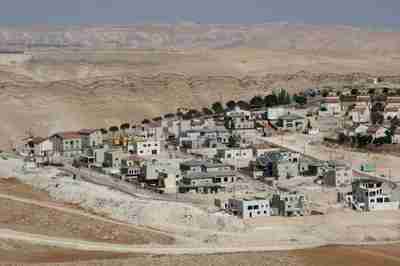 |
Israel's government has approved new construction of 2,300 new settlement units in the West Bank, presumably as punishment to the Palestinian Authority (PA) for its unilateral moves to gain UN recognition as a state, including the PA's recent recognition as a member of UNESCO. The approval is said to be the first installment in a larger plan to be decided upon in the near future. It also includes a freezing of the transfer of funds to the PA under extant agreements. Israel National News
US, UK and EU government officials all strongly criticized Israel's plans to build new settlements in the West Bank. UK Foreign Secretary William Hague leveled harsh criticism at and condemned Israel's announcement, calling it "a serious blow to the Quartet's efforts to restart peace negotiations." EU foreign policy chief Catherine Ashton joined the US in condemning Israel's settlement plan, saying that she was "deeply concerned by the latest Israeli decisions to expedite settlement activities in response to Palestinian accession to UNESCO. Israeli settlement activity is illegal under international law including in east Jerusalem and an obstacle to peace. We have stated this many times before. We call on Israel to reverse this decision and call on both sides to continue their engagement with the Quartet on advancing peace efforts." The foreign minister of Jordan, which signed a peace treaty with Israel in 1994, said, "This Israeli escalation is a blow to international peace efforts," and that Jordan "demands Israel stop its illegal provocations and action, and take practical steps towards peace talks with the Palestinians." Jerusalem Post
Israel's Prime Minister Benjamin Netanyahu said on Wednesday that Israel's decision to accelerate settlement building was a fundamental right, not punishment for the Palestinians joining UNESCO. Netanyahu said that the whole of Jerusalem as Israel's "eternal, indivisible capital", and that "Jerusalem will never return to the state it was in on the eve of the Six Day War." However, Netanyahu contradicted a senior Israeli government official who had said on Tuesday that the announcement was "punishment after the vote at UNESCO." AFP
After months of torture and bloody massacres on its own unarmed protesters, the regime of Syria's president Bashar al-Assad says that it has agreed to a peace plan proposed by the Arab League. The plan calls for an end to all government violence, release of political prisoners, and to allow foreign journalists into the country to monitor the situation. Negotiations will begin in Cairo in two weeks. However, the opposition wants Assad to leave, and don't want negotiations with Assad, so the deal may well fall apart. VOA
A new "Freedom Waves to Gaza" flotilla left Turkey on Wednesday, and is expected to approach Gaza early Friday morning, with the purpose of breaking Israel's blockade of Gaza. Previous flotilla attempts in the past few months were prevented from leaving by their host countries, Greece and Turkey, respectively. In this case, the flotilla plans were kept secret, so that they would not be stopped. The first flotilla had a confrontation with Israeli defense forces on May 31, 2010, resulting in the deaths of nine Turks. Disagreements over whether Israel should apologize have caused a major rift between Israel and Turkey. Haaretz
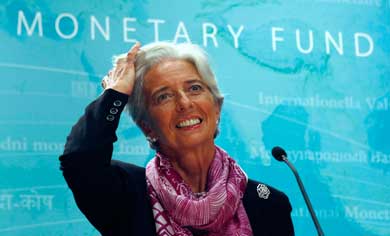 |
The fallout from Prime Minister George Papandreou’s decision to call for a referendum on Greece's eurozone membership continues to grow, as furious officials try to decide what to do next. Greece was due to receive an €8 billion bailout installment in the next few days, but now the payment is in doubt. International Monetary Fund managing director Christine Lagarde has canceled the payment until the planned referendum has taken place:
"I welcome the prime minister’s indication that the referendum which has been announced will take place as soon as possible so that the euro summit agreement can be implemented expeditiously.As soon as the referendum is completed, and all uncertainty removed, I will make a recommendation to the IMF Executive Board regarding the sixth tranche of our loan to support Greece’s economic program."
Prime Minister George Papandreou is being condemned by furious EU leaders Nicolas Sarkozy and Angela Merkel, as well as by politicians in Athens. He will face a vote of no confidence of Friday, and if it succeeds, then the referendum will be canceled and instead there will be new elections. Sarko and Merkel summoned Papandreou to an emergency summit meeting in Cannes on Wednesday, to tell him that Greece will not receive any more loans until the issue is resolved. However, Papandreou insisted on going forward:
"The Greek people want us to remain in the euro zone,» he told reporters after talks with French President Nicolas Sarkozy and German Chancellor Angela Merkel. «We are part of the euro zone and we are proud to be part of the euro zone.Being part of the euro zone means having many rights and also obligations. We can live up to these obligations. I do believe there is a wide consensus among the Greek people and that's why I want the Greek people to speak."
Papandreou announced that the referendum will take place on December 4. Expect to see total chaos in Europe until then, as everybody works to convince the Greek people to vote to say in the eurozone. Kathimerini
Greece has a history of military coups, and the firing on Tuesday of top army generals has raised concerns in the foreign press that a coup might be in progress or imminent. However, Greeks are shrugging off these concerns, saying that the army no longer has enough political power. According to one analyst, the move is simply pure politics, done at a time when Papandreou fears losing the planned vote of no confidence. "To reshuffle the top brass is (something) typically done by outgoing governments, which appoint some of their own to top position before leaving power. We do not think that the move was indicative of increased coup risks, simply because the Greek army of today is not likely to even mull coup ideas." Reuters
(Comments: For reader comments, questions and discussion,
see the 3-Nov-11 World View -- Fallout spreads from Greece's call for referendum
thread of the Generational Dynamics forum. Comments may be
posted anonymously.)
(3-Nov-2011)
Permanent Link
Receive daily World View columns by e-mail
Donate to Generational Dynamics via PayPal
Foreign central banks are no longer buying US Treasuries
This morning's key headlines from GenerationalDynamics.com.
* Universal fury at George Papandreou for referendum call
* Papandreou's government in Greece may be near collapse
* 'Sighs of relief have been replaced with cries of horror!'
* Foreign central banks are no longer buying US Treasuries
* Speed of MF Global's collapse astounds and frightens investors
* U.S. says that Allied Home Mortgages defrauded homeowners
* Outflow of ethnic Russians from North Caucasus worsens
* Kyrgyzstan demands that U.S. close its air force base
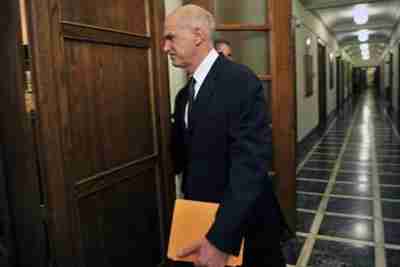 |
Everyone is furious about Greek Prime Minister George Papandreou's abrupt call for a public referendum on whether to accept the euro bailout deal negotiated last week. Greek people, Greek politicians, and EU politicians are all expressing shock and incredulity that Papandreou is throwing the entire negotiation into crisis mode again, just a few days after the deal was negotiated, since a "no" vote on the referendum would evidently mean that Greece will go bankrupt, leave the eurozone, and return to the drachma currency. In fact, Greece is scheduled to receive its next bailout payment in a few days, but will run out of money again in January, when the referendum is supposed to take place. Greek people feel that they'll be screwed either way. A lot of people are wondering why he did it. Was it for domestic political purposes? Was it to force European leaders to sweeten the bailout deal? Or was he just completely disgusted and exhausted? My vote is on the last option. At any rate, Europe is in a state of crisis again on Tuesday evening. Reuters
Prime Minister George Papandreou faced a fight for his political survival as he came under intense pressure from within his own party and from opposition politicians to ditch the referendum idea and call snap elections or form a coalition government. Papandreou met with the Cabinet on Tuesday night to discuss his decision to demand a referendum, an initiative that even Finance Minister Evangelos Venizelos was in the dark about. Venizelos was hospitalized early on Tuesday with suspected appendicitis. The meeting went on late into the night but Papandreou is thought to have told his ministers that he would not back down from his referendum proposal and a planned vote of confidence in Parliament on Friday. Kathimerini
That's how the BBC introduced the story about the European reaction to the referendum announcement. What's absolutely fascinating about this is that the cries of horror are over the question of letting the people decide what they want to do, which is what's supposed to happen in a democracy.
I love it when there's a referendum, because a referendum tells us a lot about what the people are thinking, and what generational changes are occurring, especially if we can get exit poll data breaking down the vote by age group. That's what happened in the 2005 referendum where "France rejected the EU Constitution." I was able to show from the exit polling data that the vote was generational, with older people favoring the constitution, and younger people opposing it. My favorite quote was from a man interviewed on the BBC, who said, "My grandfather fought in World War I. My father fought in World Wars I and II. I fought in World War II. And now, for 60 years, my children and grandchildren have lived in peace. That's a good enough reason to me to vote 'yes' on the Constitution."
That rejection was an incredible shock to the EU leaders, who decided that the people should never be given another chance to make another decision. When the Lisbon Treaty came along to replace the Constitution, they made sure that no one could vote for it. But they had to let Ireland vote in 2008, as I described in "Europe in 'chaos' as Ireland rejects Lisbon Treaty." But they got Ireland to take another vote, and the Lisbon Treaty finally passed.
As I've said many times before, it's a basic principle of Generational Dynamics that, even in a dictatorship, great events are determined by generations of people, not by the politicians. We've seen politicians try to force decisions on an unwilling population, and it works for a while, but every time, the results are just as if the politicians hadn't tried at all.
Last week's crazy Rube Goldberg bailout scheme was so pathetic as to be laughable. The euphoria lasted only a couple of days before Italy's bond yields began to surge again, indicating that investors didn't believe it. It's now pretty clear to everyone that Greece can never be saved, that China won't come to Europe's rescue, and that Italy is following Greece down the drain.
As I've also said many times before, a global financial crisis is mathematically certain, coming with 100% certainty. If the crisis occurs in the near future, then history may blame Greek Prime Minister George Papandreou for causing it.
For years, the ability of the U.S. government to run exponentially growing deficits has been made possibly by foreign central banks (FCBs) purchasing U.S. Treasuries. An analysis shows that foreign central banks began slowing purchases a little over a year ago. About 7 weeks ago, FCBs began actively selling U.S Treasuries. As this trend continues, without FCB support, the US Treasury and equities market will both be in big trouble at some point in the not too distant future. As I've said many times, my expectation is that the U.S. will default, but the dollar will remain strong in a spiraling deflationary environment. Lee Adler - Wall Street Examiner
Two weeks ago, hedge fund firm MF Global had a market cap of $600 million. A couple of days ago, the firm was bankrupt and worthless. Superstar manager Jon Corzine, former Governor of New Jersey, managed to destroy the firm in one year by betting $6.3 billion that Italy and Spain's debt would increase in value. As the euro crisis continued, Italy and Spain had increasing financial problems, and MF Global was busted. And now, the firm is worse than bankrupt -- it's also under investigation for criminal activity. MF Global advertised itself as a "broker" (as opposed to an "investment bank"). As a broker, they were required to keep their clients' funds strictly separate from their own assets. Clients' funds amounted to $7.3 billion, but now some $900 million is missing, and the FBI is investigating. Meanwhile, clients should be able to move their money out of MF Global to another brokerage, but MF Global's accounts are frozen, and there may not be any money left to move. The same people who caused the financial crisis in the first place are still in the same jobs, paying themselves multi-million dollar bonuses to do the same things, setting us up for the next major financial crisis. Bloomberg and Wall Street Journal (Access)
Allied Home Mortgage Capital Corp., which last year claimed to be the biggest closely held mortgage broker in the U.S., was sued by federal authorities for alleged fraudulent lending practices. The government claims one-third of the 112,324 loans originated by Allied from 2001 through 2010 defaulted, forcing the U.S. Department of Housing and Urban Development to pay $834 million in insurance claims. Saying that the company had a "culture of corruption," the complaint said, "Allied has profited for years as one of the nation’s largest FHA lenders by engaging in reckless mortgage lending, flouting the requirements of the FHA mortgage insurance program, and repeatedly lying about its compliance. In the past decade, Allied has originated loans out of hundreds of branches it never disclosed to HUD." Bloomberg
 |
Russian officials are increasingly concerned that the ethnic Russian population of the North Caucasus regions is decreasing, as people flee the violence and threats of terrorist attacks. At the same time, the mostly Muslim indigenous population is increasing rapidly, giving support to the North Caucasus separatist movement. Moscow is increasingly concerned that it will lose control of the entire region. Historically, the Caucasus region is one of the most violent on earth, because of the interethnic wars, and because it's one of the major regions (along with the Crimea and the Balkans) where fault line wars have been fought between the Muslim civilization and the Orthodox Christian civilization. Generational Dynamics predicts that another war of this type is approaching. Jamestown
Almazbek Atambayev, who was elected president of Kyrgyzstan on Sunday in a disputed election, said that the U.S. air base needs to close by 2014 because its presence on Kyrgyz soil puts the nation at risk of retaliatory strikes from those in conflict with the United States. "We know that the United States is often engaged in conflict. First in Iraq, then in Afghanistan, and now relations are tense with Iran. I would not want for one of these countries to launch a retaliatory strike on the military base." The Manas air base in Kyrgyzstan is a key logistical hub for operations in the Afghanistan war, but the U.S. has said it would withdraw from Afghanistan by 2014. AP
(Comments: For reader comments, questions and discussion,
see the 2-Nov-11 World View -- Euro in crisis again, as Greece melts down after referendum bombshell
thread of the Generational Dynamics forum. Comments may be
posted anonymously.)
(2-Nov-2011)
Permanent Link
Receive daily World View columns by e-mail
Donate to Generational Dynamics via PayPal
Euro bailout deal unravels as Italy's bond yields soar
This morning's key headlines from GenerationalDynamics.com.
* Euro bailout deal unravels as Italy's bond yields soar
* Greece will hold a referendum on the euro bailout deal
* Greece's opposition parties accuse Papandreou of blackmail
* Italy's bond yields (interest rates) rise above 6%
* Financial crisis is creating two conflicting Europes
* FAQ on Europe's EFSF bailout fund
* Islamic Jihad threatens Hamas in Gaza
* China seeks to set up military bases in Pakistan
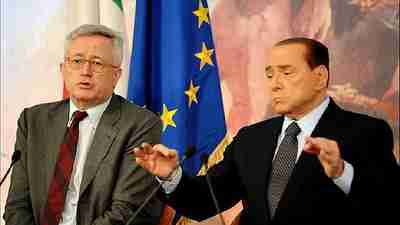 |
A major union rally is planned for Saturday in Rome to protest the austerity measures of Italy's Premier Silvio Berlusconi, including measures to raise the retirement age, and to allow union members to be fired more easily. Berlusconi is scheduled to go before Parliament on Nov. 9 and Nov. 10 to present "the commitments made with Europe and the measures for growth." The fate of these measures is crucial to the entire eurozone and the bailout plan, because Italy has the eurozone's third largest economy, and there's not enough money available to bail Italy out. AP
Greece's Prime Minister George Papandreou surprised European officials on Monday by announcing a national referendum on whether to accept the euro bailout deal. Papandreou, apparently disgusted by the fact that Greeks have the contradictory desires of rejecting the deal but remaining on the euro currency, said "The command of the Greek people will bind us. Do they want to adopt the new deal, or reject it? If the Greek people do not want it, it will not be adopted." The referendum announcement has caused European officials to be concerned, because a rejection of the euro deal would mean that Greece would go into default, and the euro bailout plan would collapse. Telegraph
Opponents of the Socialist party's Prime Minister George Papandreou are rejecting the call for a Greek referendum on accepting the bailout deal. The opposition at both ends of the spectrum -- the conservatives and the communists -- are demanding that Papandreou call for new elections, rather than a referendum. According to the conservative New Democracy leader, "Mr Papandreou is dangerous. He has tossed Greece’s future in Europe in the air like a coin." According to the Communist party leader, "No to the blatant blackmail and the ideological terrorization of the people." If this referendum goes through, it's going to be very interesting. Kathimerini
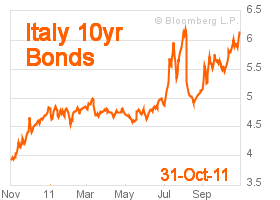 |
Long time readers have seen many graphs like the one on the right -- except that those were for Greece. So if you remember those graphs, then you know the drill. Italy's 10-year bond yields went above 6% on Monday, meaning that if Italy wants to borrow money, then they have to agree to pay over 6% interest, which is not sustainable. And it's even worse than that, because you'll recall from the graphs for Greece that the yields keep rising, month after month. Each increase in interest rate makes it less and less likely that the country will avoid default, which means that investors will demand even higher interest rates, so a vicious spiral occurs. It's not an exaggeration to say that Italy was foremost in the minds of the politicians last week, as they came up with their crazy Rube Goldberg bailout scheme that they announced at 4 am. Usually when they announce one of these screwy plans, the euphoria lasts a few weeks. But now, only four days later, the markets are saying that the euphoria is already over. According to one analyst, "The latest deal to resolve the euro-debt crisis is grandiose in its scope but limited in its details. Italian bond yields are telling us that the market is not confident that the summit will draw a line under the crisis. They are saying the market still sees scope for bailout contagion and Italy is the next" in line. Bloomberg
The recent negotiations over the euro bailout plan were bitter for many reasons, not the least of which is that the 10 non-euro EU nations, led by Britain, are complaining that they're excluded from participating in decisions by the 17 eurozone nations, even though those decisions affect all 27 EU nations. The split between the non-euro and euro nations is growing, and Germany, the country that pays most of the money, is making most of the decisions. However, the eurozone itself is bitterly divided. In particularly Germany has to live with the Mediterranean counties -- which have a strong presence in the euro zone -- which have a tendency to favor state-run industrial policy and protectionism, unlike Germany. Spiegel
For those who want to delve more deeply into the €440 billion European Financial Stability Facility (EFSF), this PDF file from the EFSF organization itself will provide answers. efsf.europa.eu
The flare-up in violence between Gaza and Israel for the last few days is part of the general destabilization of Gaza and southern Israel brought about by the chaos in the Sinai Peninsula following the Arab Spring, partly as an effect of internal Egyptian instability and partly due to a massive inflow of arms from Libya. Islamic Jihad, which was responsible for the barrage of missiles from Gaza into Israel, is displacing Hamas as the dominant militant group in Gaza especially given the fact that dozens of disgruntled Hamas members are reported to have defected to Islamic Jihad. Asia Times
China is demanding that Pakistan allow China to build military bases in the Pakistan tribal areas, where they would be facing U.S. forces, and in the disputed Kashmir/Jammu regions, where they would be facing Indian forces. China is placing a higher priority on these bases over a Pakistan request that China build a naval base in the strategically important Gwadar port, where it would undermine Indian naval dominance in the region. Chinese troops also took part in a Pakistani military exercise which was held along the Indian border in August. Memri
(Comments: For reader comments, questions and discussion,
see the 1-Nov-11 World View -- China seeks to set up military bases in Pakistan
thread of the Generational Dynamics forum. Comments may be
posted anonymously.)
(1-Nov-2011)
Permanent Link
Receive daily World View columns by e-mail
Donate to Generational Dynamics via PayPal
Web Log Summary - 2016
Web Log Summary - 2015
Web Log Summary - 2014
Web Log Summary - 2013
Web Log Summary - 2012
Web Log Summary - 2011
Web Log Summary - 2010
Web Log Summary - 2009
Web Log Summary - 2008
Web Log Summary - 2007
Web Log Summary - 2006
Web Log Summary - 2005
Web Log Summary - 2004
Web Log - December, 2016
Web Log - November, 2016
Web Log - October, 2016
Web Log - September, 2016
Web Log - August, 2016
Web Log - July, 2016
Web Log - June, 2016
Web Log - May, 2016
Web Log - April, 2016
Web Log - March, 2016
Web Log - February, 2016
Web Log - January, 2016
Web Log - December, 2015
Web Log - November, 2015
Web Log - October, 2015
Web Log - September, 2015
Web Log - August, 2015
Web Log - July, 2015
Web Log - June, 2015
Web Log - May, 2015
Web Log - April, 2015
Web Log - March, 2015
Web Log - February, 2015
Web Log - January, 2015
Web Log - December, 2014
Web Log - November, 2014
Web Log - October, 2014
Web Log - September, 2014
Web Log - August, 2014
Web Log - July, 2014
Web Log - June, 2014
Web Log - May, 2014
Web Log - April, 2014
Web Log - March, 2014
Web Log - February, 2014
Web Log - January, 2014
Web Log - December, 2013
Web Log - November, 2013
Web Log - October, 2013
Web Log - September, 2013
Web Log - August, 2013
Web Log - July, 2013
Web Log - June, 2013
Web Log - May, 2013
Web Log - April, 2013
Web Log - March, 2013
Web Log - February, 2013
Web Log - January, 2013
Web Log - December, 2012
Web Log - November, 2012
Web Log - October, 2012
Web Log - September, 2012
Web Log - August, 2012
Web Log - July, 2012
Web Log - June, 2012
Web Log - May, 2012
Web Log - April, 2012
Web Log - March, 2012
Web Log - February, 2012
Web Log - January, 2012
Web Log - December, 2011
Web Log - November, 2011
Web Log - October, 2011
Web Log - September, 2011
Web Log - August, 2011
Web Log - July, 2011
Web Log - June, 2011
Web Log - May, 2011
Web Log - April, 2011
Web Log - March, 2011
Web Log - February, 2011
Web Log - January, 2011
Web Log - December, 2010
Web Log - November, 2010
Web Log - October, 2010
Web Log - September, 2010
Web Log - August, 2010
Web Log - July, 2010
Web Log - June, 2010
Web Log - May, 2010
Web Log - April, 2010
Web Log - March, 2010
Web Log - February, 2010
Web Log - January, 2010
Web Log - December, 2009
Web Log - November, 2009
Web Log - October, 2009
Web Log - September, 2009
Web Log - August, 2009
Web Log - July, 2009
Web Log - June, 2009
Web Log - May, 2009
Web Log - April, 2009
Web Log - March, 2009
Web Log - February, 2009
Web Log - January, 2009
Web Log - December, 2008
Web Log - November, 2008
Web Log - October, 2008
Web Log - September, 2008
Web Log - August, 2008
Web Log - July, 2008
Web Log - June, 2008
Web Log - May, 2008
Web Log - April, 2008
Web Log - March, 2008
Web Log - February, 2008
Web Log - January, 2008
Web Log - December, 2007
Web Log - November, 2007
Web Log - October, 2007
Web Log - September, 2007
Web Log - August, 2007
Web Log - July, 2007
Web Log - June, 2007
Web Log - May, 2007
Web Log - April, 2007
Web Log - March, 2007
Web Log - February, 2007
Web Log - January, 2007
Web Log - December, 2006
Web Log - November, 2006
Web Log - October, 2006
Web Log - September, 2006
Web Log - August, 2006
Web Log - July, 2006
Web Log - June, 2006
Web Log - May, 2006
Web Log - April, 2006
Web Log - March, 2006
Web Log - February, 2006
Web Log - January, 2006
Web Log - December, 2005
Web Log - November, 2005
Web Log - October, 2005
Web Log - September, 2005
Web Log - August, 2005
Web Log - July, 2005
Web Log - June, 2005
Web Log - May, 2005
Web Log - April, 2005
Web Log - March, 2005
Web Log - February, 2005
Web Log - January, 2005
Web Log - December, 2004
Web Log - November, 2004
Web Log - October, 2004
Web Log - September, 2004
Web Log - August, 2004
Web Log - July, 2004
Web Log - June, 2004